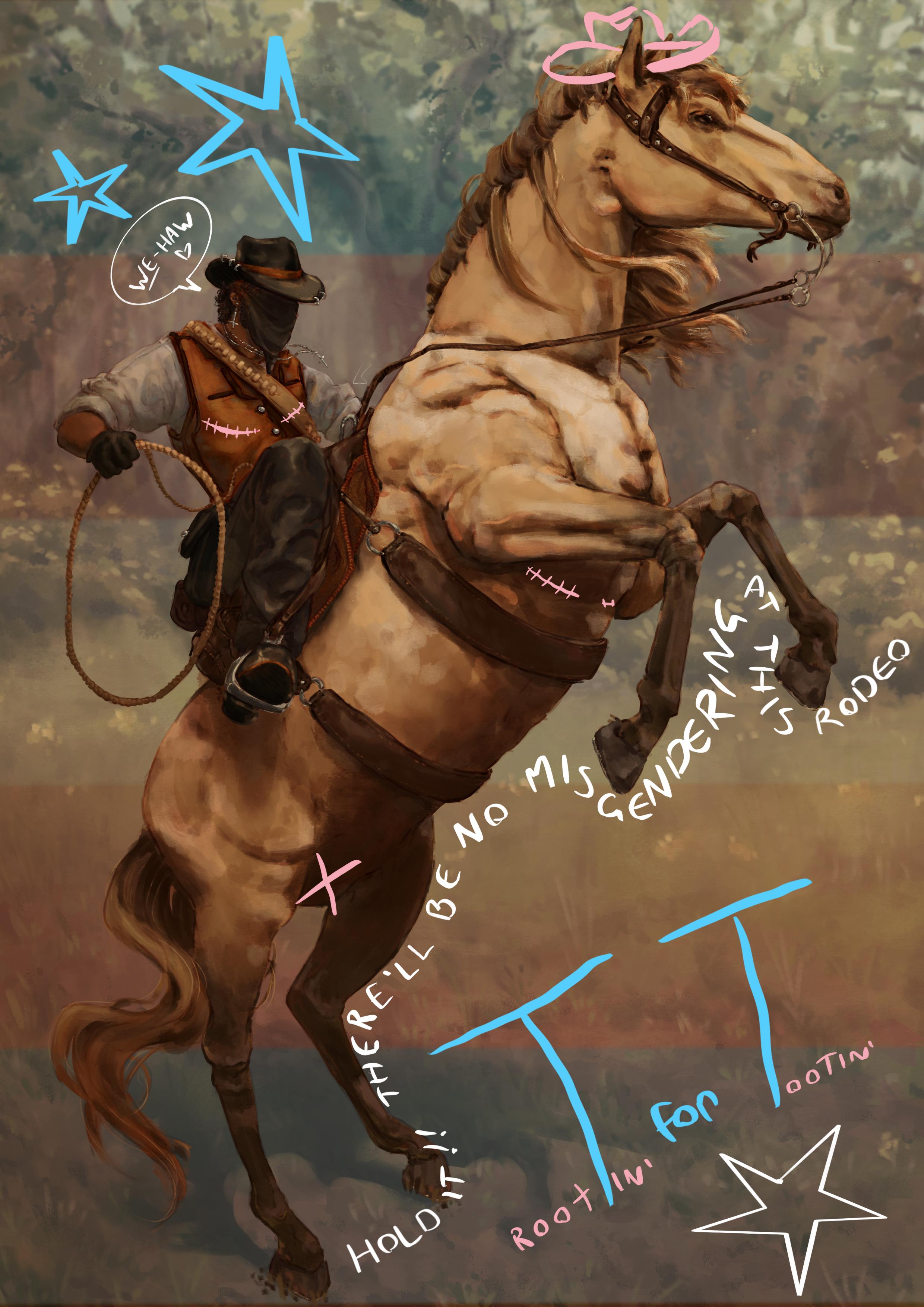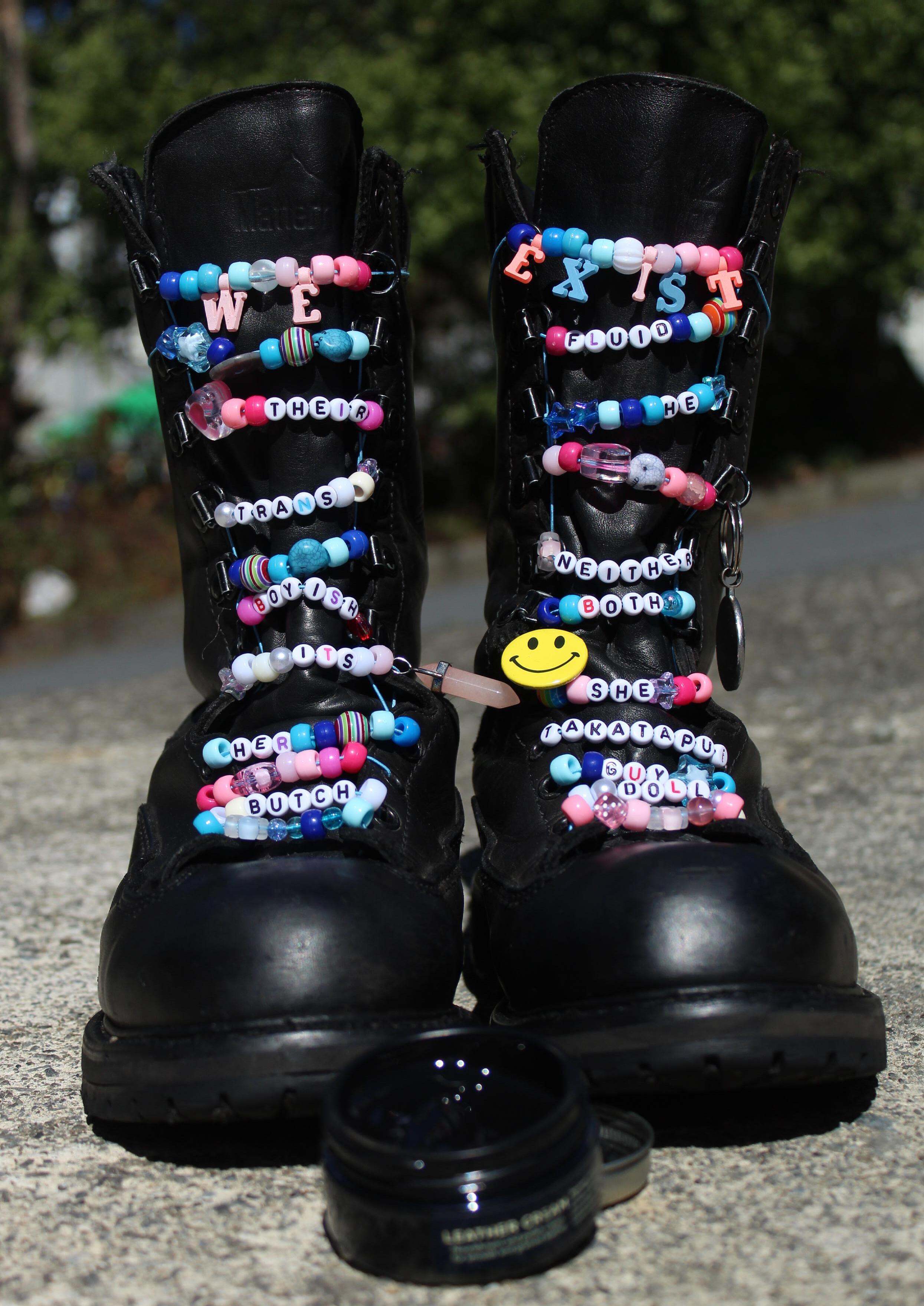
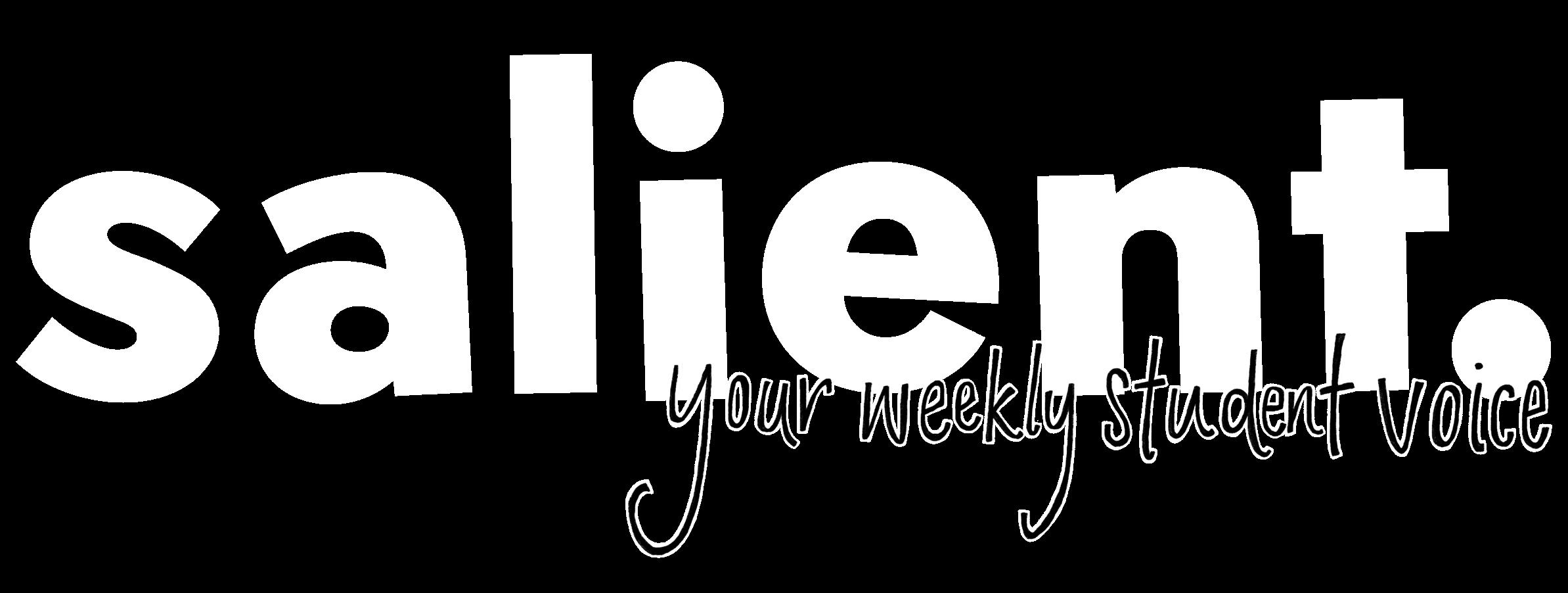
ISSUE 07 | VOLUME 87 | 22.04.2024 GUEST EDITED ISSUE
TRANS RIGHTS
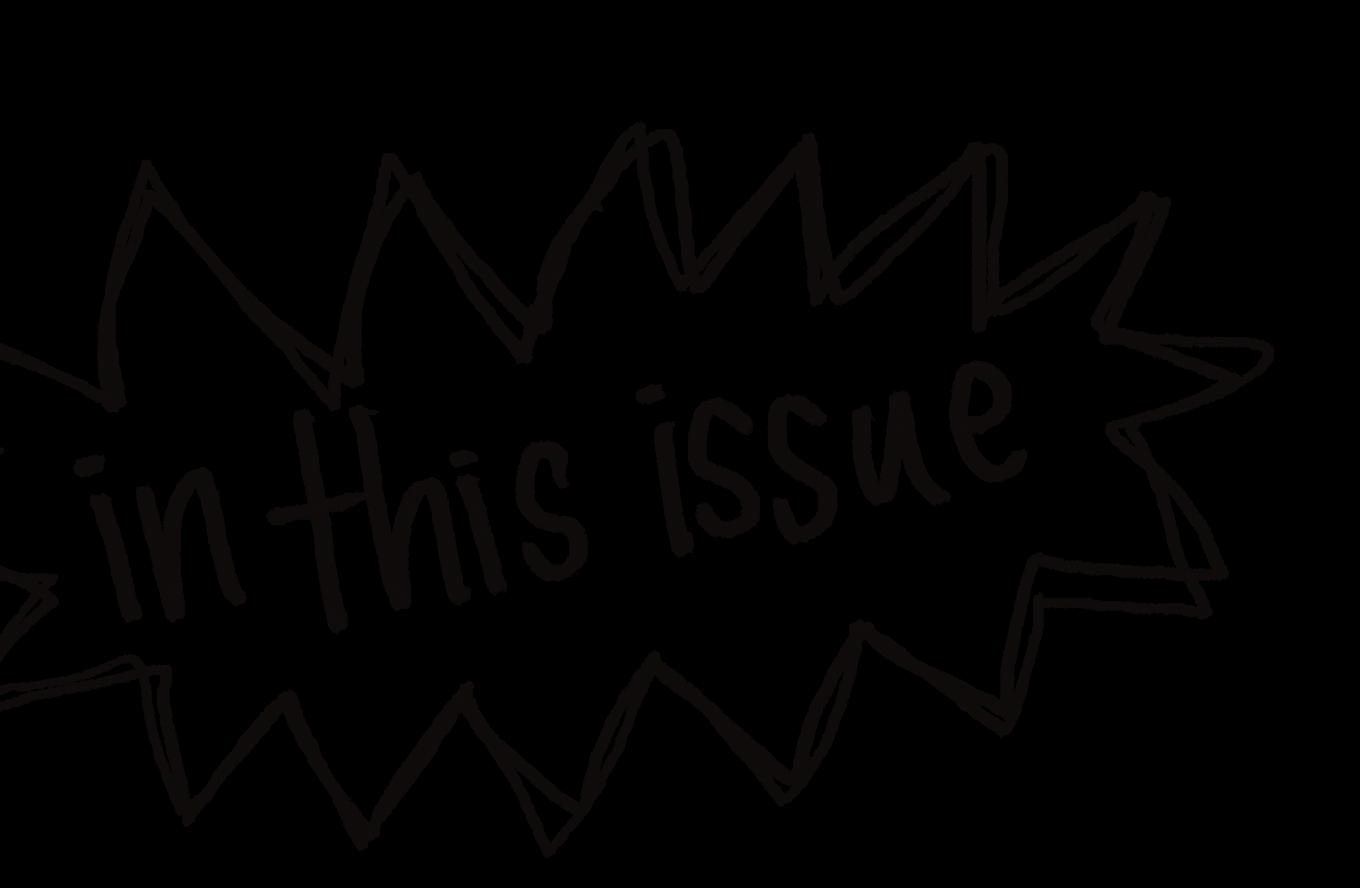
got something to say?
Our magazine, Salient, is run by students for students. Without the involvement of students, we wouldn't be able to operate. Every year, we welcome pitches and inquiries from individuals who are interested in writing for us. For more information, please email editor@salient.org.nz or visit our website at salient.org.nz.
complaints
Complaints regarding the material published in Salient should first be brought to the CEO in writing (ceo@vuwsa.org.nz). If not satisfied with the response, complaints should be directed to the Media Council (info@mediacouncil.org.nz).
about us
Salient is published by, but remains editorially independent from, the Victoria University of Wellington Student's Association (VUWSA). Salient is funded in part by VUWSA through Student Services Levy. Salient is a member of the Aotearoa Student Press Association (ASPA).
The views expressed in Salient do not necessarily reflect those of the Editor, VUWSA, or the University. 03
page 02 rārangi kōrero
TRANS RIGHTS
O'NEILL
PISS TAKE
(HE/HIM)
TRANS GUY'S GUIDE TO CHANGING YOUR NAME | MICAH NICHOLSON (he/ him) 11 KILL THE GENDER BINARY!!! | SNOW BEST (they/she) 13 THE INFO:RMATION WARS | ONJEI BOND (HE/HIM) 16 A QUEER FAITH | GIL OSTINI (he/him) 19 STEALTH | ANONYMOUS (she/her) 22 MUSINGS OF A MODERN MĀHŪ | MAUATUA FA'ARA-REYNOLDS (she/they) 25 ARTS & CULTURE | AHUREA 27 COLUMNS | TĪWAE 28 PUZZLES | PANGA 30 HOROSCOPES 31 PODCASTS | KŌNAE IPURANGI 32 PACIFIC NATIONS & LANGUAGES | MAUATUA FA'ARA-REYNOLDS (she/they), ASHLEIGH PUTT-FALLOWS (she/her/ia) 33 THE NEWS | KAWEPŪRONGO find us Twitter @salientmagazine | Facebook fb.com/salientmagazine | Instagram @salientgram | www.salient.org.nz
EDITORIAL | ĒTITA 04 TAKATĀPUITANGA | TEDDY
(he/it/ia) 06 THE
| FLYNN
08 A
I’m Teddy. You might recognise me from Salient’s podcasts or social media. My job this week, though, has been to pull together this issue, which has been no easy feat.
In the past, Salient has been criticised for focussing too much on smaller communities, not being what some would call a student magazine for “all” students. If you think that the theme of this week’s Salient buys into that rhetoric, please bear with.
I know you want to read about spots in town to grab a bevvie, or maybe skim a feature someone has written about their terrible flatting experiences, and that’s fair. If you don’t want to read this issue, you don’t have to. However…
Our trans whanau, myself included, are pretty consistently underrepresented in all media. (If you don’t agree, you’re probably chronically online.) This issue is for our trans community, our friends, our loved ones, to talk about whatever they want to—we’ve got a feature about how to choose a new name, we’ve got a feature about the bathrooms on campus, we’ve got an interview talking about transness and religion.

Trans and Takatāpui rights are consistently yapped about by people who really don’t know anything about us. So, I wanted this issue to be about getting to know us. Learn about our identities, learn about our journeys, learn about things we find funny. Then, you can leave, and you can support us. Fight with and for us.
This issue obviously doesn’t represent the entire trans community. There are far too many experiences and journeys to be able to fit everyone into one issue of a student magazine. I wasn’t able to find as many trans feminine or trans POC writers as I had initially wanted to. (Here, this is where I will say: please, if you’re from these communities, write for us! Pitch us your ideas!! We would love to have you!!!) However, I’m really proud of our writers for allowing me to share their wairua through their stories. If you want to hear more about the making of this issue, as usual, you can catch me on the Salient Unedited podcast. :)
Anyway, when all is said and done, whether you’re trans or not, I hope you enjoy this issue. It’s been made with every ounce of aroha in my being.
TRANS RIGHTS editorial ētita
Kia ora koutou, and welcome to the Trans issue of Salient.
cover artists FRONT Kermit Delab (they/he) | @grotesquik BACK Lief (any/all) page 03

Takatāpu
a kōrero by Teddy (he/it/ia) |
Ngāpuhi
As someone who has struggled with identity and what it really means to exist as someone who is both Māori and Queer, I think it’s reasonable to say that I long for more Takatāpui stories. Of course, many people already know that when the pakiwaitara of Tūtānekai and Hinemoa is told, it is usually missed that Tūtānekai is in a Takatāpui relationship with Tiki, and it’s later implied that he joins their relationship, (yay polyamory!) However, that’s not really the kind of Takatāpui kōrero I’m meaning.
Takatāpui is a Māori identity which encompasses wairua, sexuality, gender, and the fluid nature between them. Our tūpuna didn’t live in a binary society governed by labels and the cishet rules that we live by now. They simply existed as they were. I want to hear more Takatāpui stories drenched in our tāhuhu kōrero, I want to experience Takatāpui pūrākau, where us Māori queers can get together and talk about our own, real experiences. I want to kōrero with my kaumātua about their Takatāpui experiences, I want to share my own stories with them. I want us to bask in the glow of being Takatāpui, because Takatāpuitanga is a taonga.
I find it interesting that historically, transgender people have been seen as people who are trying
to “corrupt” society by attempting to change the perceptions of gender that the West have. Take for example, how pressed people still get over bathrooms. (Fuck, where I’m from up North, we usually have a longdrop at the marae; and that’s definitely gender neutral.) For a long time, people tried to claim that trans people existed because “our brains didn’t match our bodies.” That’s been, obviously, proven false. There’s even the argument to make about gender dysphoria, and whether or not you have to have it to be transgender, and what it means to have it, blah blah blah, whatever.
I know that I am transgender because that is what I am. There’s not much more to it. It’s in my wairua. I am not binary, I can’t exist within the Western binary society that has been created. It’s as simple as that. And after talking to some takatāpui whanau, I know that a lot of them feel the same.
Though I’m still learning, I know that Māori words don’t have a direct translation into English. Our kupu are beyond Pākehā understandings. They are an imprint my tūpuna has left, they are vast concepts and wide ideas that flow throughout time and connect us with each other. Takatāpui has meant lovers of the same sex. Now, it transcends that. When I say
page 04 features ahuatanga
that I am Takatāpui, it means I am aroha, it means I am embracing the ways that my tūpuna existed and I am following in their footsteps to be what I am. It means I am masculinity, I am femininity, I am both. Takatāpui is about an intersection of identities, it is about how being Māori and being Queer react to one another, and how they create a new experience of life.
Existing as Takatāpui Māori in colonised Aotearoa is an act of resistance.
If you are Takatāpui, in whatever sense of the word, be it whakawahine, tangata ira tāne, irawhiti, or many of the other kupu that can be used under this umbrella: arohanui e kare. If you are fa’afafine, fa’afatama, twospirit, māhū, rae-rae, vaka sa lewa lewa, akava’ine or any of the other beautiful indigenous identities, the same goes for you. You’re so, so loved.
If you are one of the people that still rags on about trans people, ko wai hoki koe? Get a grip.
There are many ways that you can support the trans people that surround you. Respect our identities, respect that you may not be able to understand them. Honour our names and our pronouns, because we
if you are one of the people that still rags on about trans people, ko wai hoki koe? get a grip.
g
have had to work hard for them. Call out your mates when they start saying transphobic shit. Support gender affirming medical care fundraisers, whether that means sharing them, or donating to them yourself, if you can. Kōrero with us about inclusive tikanga and make an attempt to learn the words we use. With a right-wing government now in charge, it’s time to start engaging politically in support of Takatāpui rights. You might be able to afford to sit back and ignore them, but our community can’t.
Trans and queer existence is something that spans generations, something that has existed forever and will exist forever in every part of the world, touching every small piece of humanity that continues to endure. That means that trans and queer resistance is something that will have to exist for a long time, too. It’s up to us now to ensure that the future is safe for our Takatāpui rangatahi and beyond.
He Takatāpui ahau. Kia ora.
page 05
puitanga


Kelburn’s Gender Neutral Toilets,
Ranked by Actual Real Life Transgender
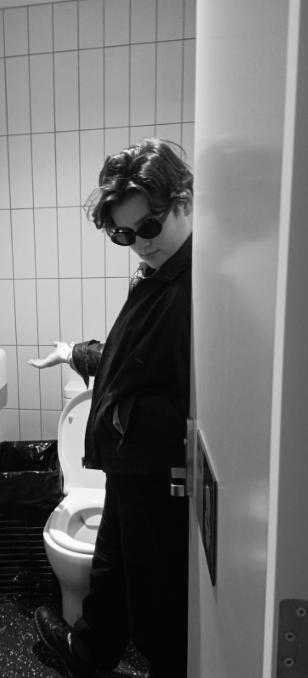
Piss taken by Flynn (he/they)
All right folx, it’s business time. Time to do your business. But where? Maybe you’re a gender freak of some kind and even at Te Herenga Waka you fear queerphobia (Does that make you queerphob phobic?), or perhaps you want to be a loo connoisseur like me, eager to step bravely into a new world of linoleum.
Either way, you don’t have a goddamn clue which toilets will safely house you in your most vulnerable moments, and which will betray you. You, woeful simpleton, are in need of informing on where is best to lay your arse. Well, fear Kelburn’s ambiguously signposted loos no more. It is I, your beloved local transsexual terror, here to guide you down these hallowed halls to safety.
All in all, Vic's Kelburn campus boasts 65(?) gender


page 06 features ahuatanga
PISS TAKE
THE
A Hubboard Under the Stairs

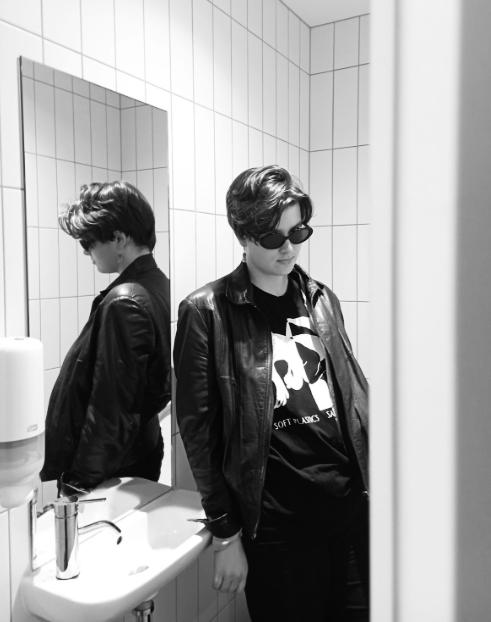
A Fan Favourite
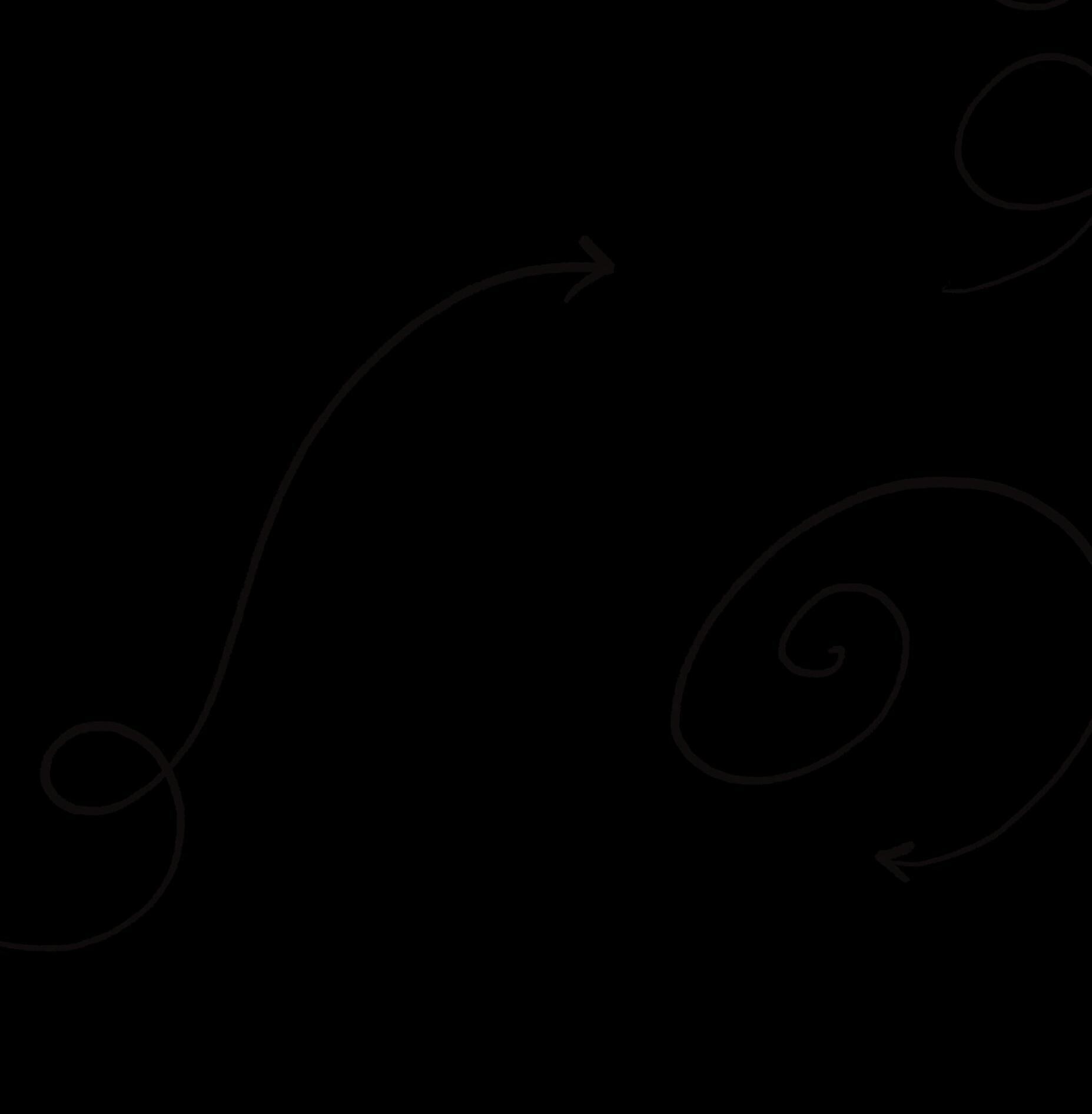
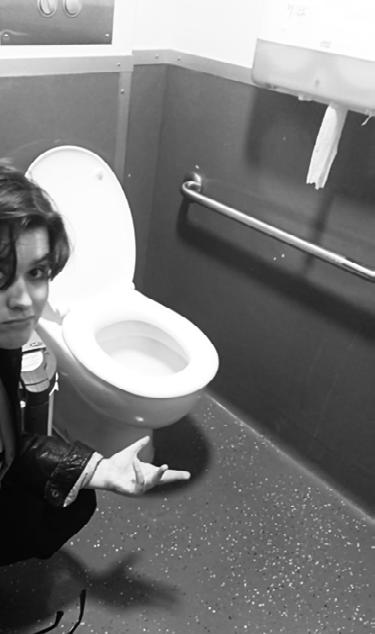
Unpopular opinion: the toilets by Louis’ on the ground floor of the Hub are OVERRATED. Sure, they’re lacking that Minecraft creeper green decor that the ones under the stairs relish in, but they're plentiful. But if you’re in struggle city trying to get your business done and the LIGHT TURNS OFF, don’t come crying to me! Whoever thought of motion-sensing lights in a toilet has never experienced bowel problems. To make matters worse, the first toilet across from the entrance door has a significant gap in it which could potentially give some nosy bugger a peek. The graffiti is entertaining, though. If you’re a budding shithouse poet, this one’s for you. It’s for me when I want to look at my butt in a full length mirror.
7/10, a solid goto, but has some
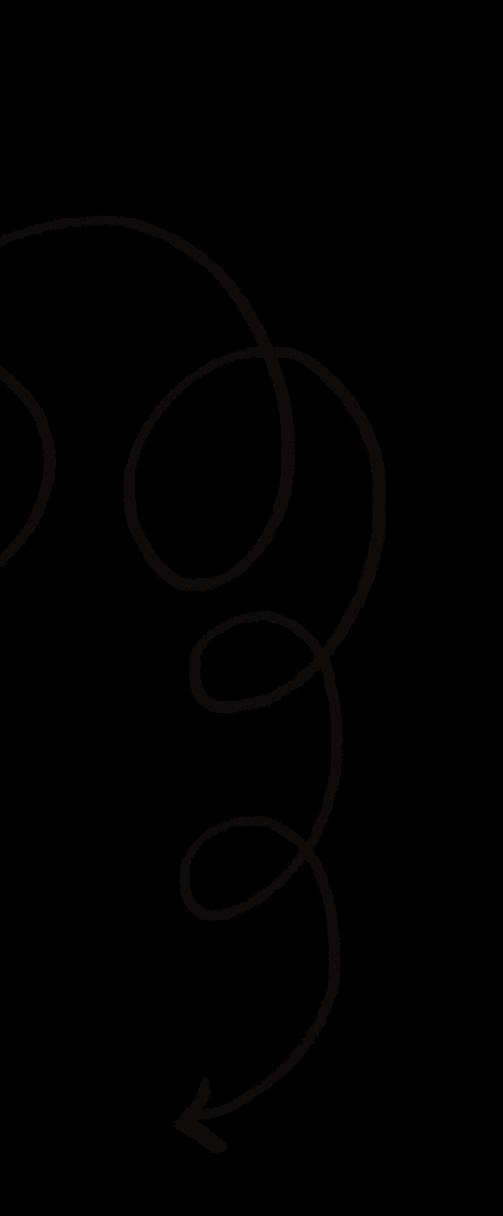
Only real ones go to Murphy level 3 to poop. I found this toilet when I was taking a wee break during my exams last year. It came in clutch. It’s a little small, but with two stalls to pick from I can’t complain. It’s quiet, generally clean, and private. I have no complaints! The signage, which is just a toilet silhouette, is slightly absurd. Like, do you have something to prove? After a lifetime of seeing little stick figures in pants or skirts it feels odd to have a toilet pictured so unambiguously on a sign. I suppose you can’t put anything else on there.
8/10, loses points only for being a bit small. It’s not the most accessible.
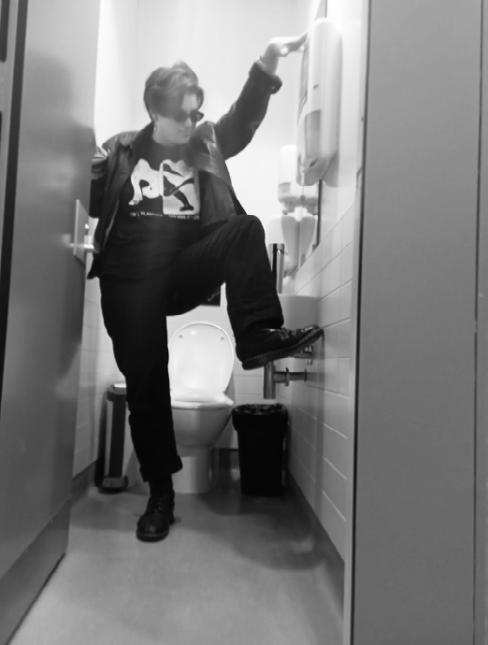
features ahuatanga
PISS TAKE
page 07 Thank you for coming with me mentally, emotionally, and gastrically on this journey. I sincerely hope I’ve saved you and your fruity bum some time.

CHANGING YOUR NA ME
instructed by Micah Nicholson (he/him)
A caveat, that this article is largely written with trans people in mind. However, there’s no reason that only trans people can change their names, and there’s no requirement for a trans person to do so either. All human experiences are unique, and this article is intended as a guide, not a set of instructions.
page 08 features ahuatanga A TRANS GUY'S GUIDE TO

So! You want to change your name. Maybe you’re bored of it, and jealous of all your friends who had more creative parents. Maybe you hate it, and are sick of hearing the same stupid joke over and over. Maybe you, like many trans folks, feel that that arrangement of letters and syllables simply doesn’t encapsulate the person you are becoming. Whatever the reason, you’ve decided to sit down and pick a new name— good on ya!
The first thing that most folks say when they want to change their name is that they don’t know where to start. Don’t fret! That’s what this article is for. The advice most people are given is to hit up the baby name websites. While this is solid advice, the issue is that this really doesn’t narrow things down at all.
Before sitting down and diving headfirst into the internet, make a list to yourself of what you want from your new name. Something gender-affirming? Something traditionally masculine? Feminine? Neutral? Do you want a name that reflects the end of the gender binary you feel more comfortable with, or a name that subverts that expectation?
Second, think about what influences you want your name to have. Do you have a favourite character you want to pay homage to? Is there someone from primary school that had a really cool name that you remember being incredibly jealous of? If you’re able to, reach out to parents or older siblings who remember when you were born. Ask them what the discussions were around the reasons for picking your name. Family legacy? Cultural impact? They just thought it sounded cool? Think about if this is something you want to emulate with your new name—plenty of trans folks find themselves gravitating towards the name their parents had as a backup, in case they had been born the opposite sex. (I would’ve done the same, if my baby cousin hadn’t been born a few years before I came out and stole the chance from me!) Is there a noticeable theme in the naming scheme in your family? My siblings both have biblical names, and while my deadname wasn’t biblical, I did accidentally pick a name that matched that tradition!
If you aren’t vibing with that, it’s time to branch out. The next question to ask yourself, do you want to go in or outside the box? There’s plenty of names out there that started off as words for other things, and simply got co-opted into names over time. While it is a massive stereotype that trans people name themselves after inanimate objects, there’s no reason
to let the existence of that stereotype stop you from being creative. Besides, there’s plenty of parents out there who name their cis children unusual names. (My sister has a friend named ‘Star’, and both her siblings have celestial names as well.) And think of the number of plant names that are already in popular circulation, Roses and Lilies, Sages and Ferns. Don’t let yourself be limited by what’s considered already acceptable.
I’m a big fan of lists, personally. And keeping track of all the potential names can be a lot! So I highly recommend actually having a written record of your search. List your sources of inspiration. Is there a time period you particularly like? What were popular baby names in 1963? What were popular baby names in 1742? Or maybe you want to swing the other way, ‘Josh’ might have been the most popular name for boys in 2002, but it doesn’t even hit the top 50, as of 2022. What’s been trending for the newer generations? Anything that particularly speaks to you? What are the types of sounds you like? Keep track of all the things that jump out.
When that list starts to narrow, start thinking of a few other things. How does this name sound with your last name? Does it roll off the tongue? Do you want it to? What spelling of the name do you like? What pronunciation? Be aware of all the different ways people can, and will, fuck up both of those things. Work out how much that’s going to bother you. And underestimate the intelligence of people, in this case. No matter how obvious you think your name is, I guarantee you there is someone out there who will get it SPECTACULARLY wrong. I can’t count the number of times I’ve been Mika, Mike, Micha, Mitch, Meeka, Michah, Meecha, and any number of other variations.
If you’re able, start running the short-list by your friends! A name might sound cool in your head, but feel completely ridiculous when you try to introduce yourself to someone with it. Hit up a cafe where they announce your name when your order is ready—The Lab does this! It’s also a great way to discover some of the potential mistakes people will make with your name.
Don’t be afraid to experiment. Don’t be afraid to change your mind. I went by three different names after realising I was trans. The first one, essentially only online, the second, to a very select group of people, and the third is the one I still have today. But I don’t think I would’ve necessarily settled on ‘Micah’ for good. It’s on my legal documents now (and that is a pain in the ass to change!), so that’s
page 09 features ahuatanga
what it is for the foreseeable future, but a huge part of me wishes I’d experimented more when I was first working these things out. A very close friend of mine, at the time, complained that I was being annoying by changing my name “too often”, and so I settled far quicker than I felt I was ready for. If people in your life tell you that, ignore them. They don’t know you, they don’t know how easy or difficult this is for you. If you value finding a name that fits right, then they should value that journey for you too. And if they don’t? Fuck them! You deserve to go crazy and find something that feels you
Final notes to wrap up with, please, for the love of god, think about any potential implications with the name you pick. While it’s less of an issue these days, the early 2010s had a massive surge of white trans guys naming themselves after their favourite Japanese anime character. I respect the concept of claiming your favourite character’s name, but do actually think before you go jumping off the deep end. Double-check your initials, too. I did partially pick a middle name beginning with ‘A’, for the sheer comedy of having my initials spell MAN, but I also know people out there who have wound up with lessthan-ideal combinations. (I knew one unfortunate person who had the initials KYS. On the other hand, a friend of mine deliberately picked names to make their initials spell LOSS.)

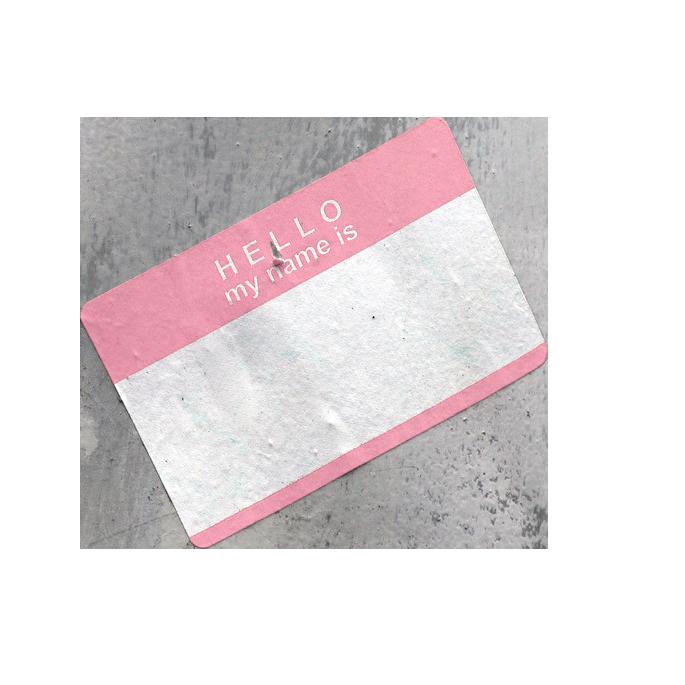
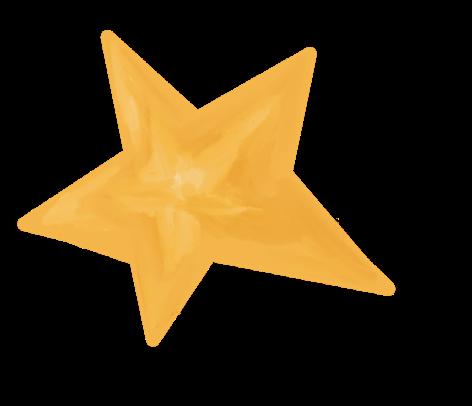
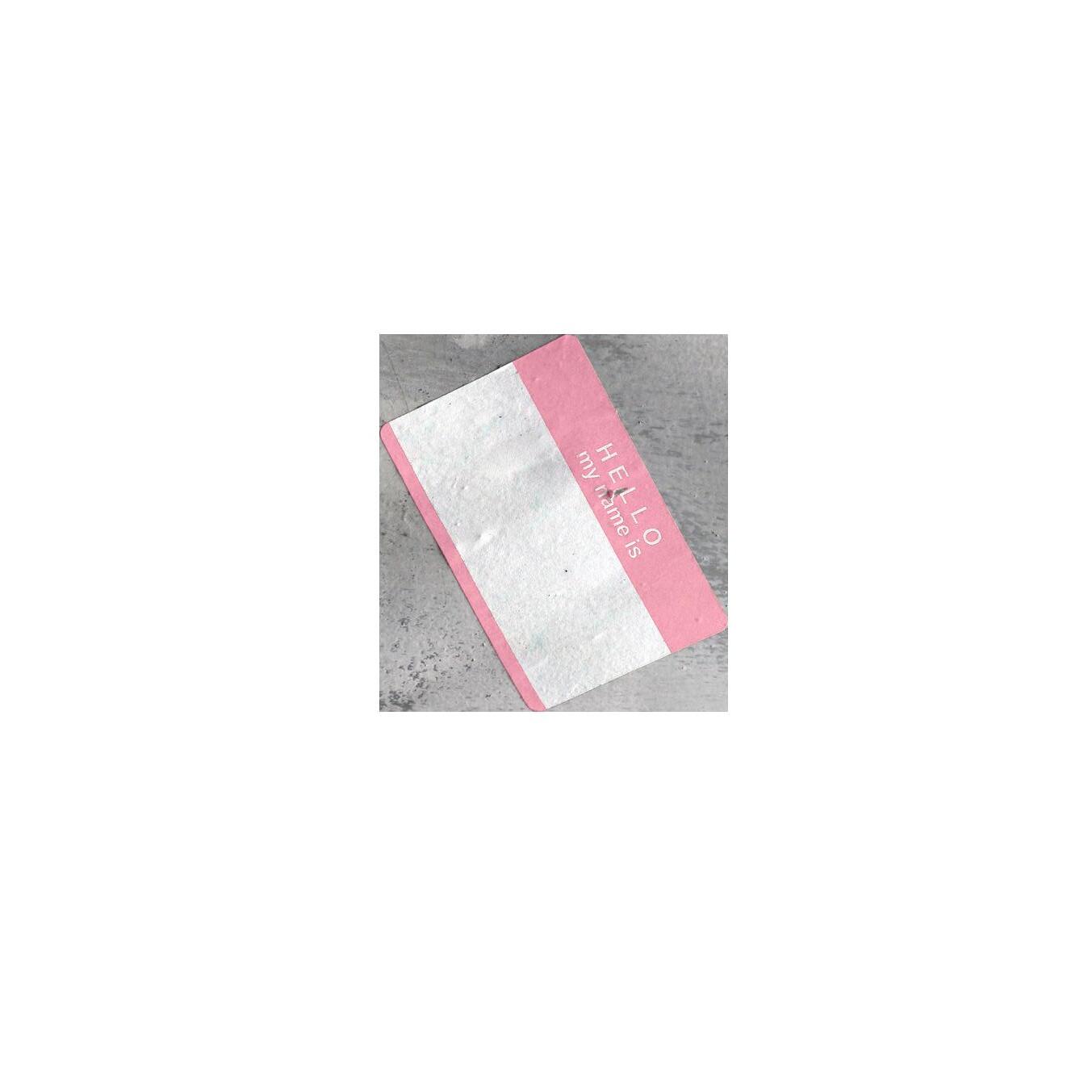
BAnd hang onto that list of discarded potential names. You never know when it might come in handy. Picking a middle name was something I found a hundred times more difficult than finding a first name, and that was partially because I had forgotten all the things I’d liked and considered the first time round.
At the end of the day, whatever you want to name yourself, that’s up to you. Names are important. They help us know who we are, and who we want to be. They’re one of the first pieces of ourselves that we offer to other people, and one of the first pieces of another person that we are lucky to receive. So long as you feel content with the name you have to share that’s all that matters, and fuck anyone who tries to tell you otherwise.
page 10

Kill the Gender
Bi y
Snow Best (they/she)
I don’t want my gender anymore. I don’t want to be told what and who I am. At some point non-binary people are forced to reckon with the fact that our personal identity only goes so far. Is it possible to exist void of gendered language? I think that the depressing fact is probably not. Not right now.
What does it mean to be non-binary? I think it is to exist in terms of the oppressor. Non. Not. Other. Weird. A fucking queer. A Tranny faggot. As the gendered subject experiences it: something that isn’t normal and doesn’t apply to me. Boys. Are you really boys? Girls. Are you really girls? We aren’t all fully masculine or feminine. We all exist within a spectrum of different aspects of masculinity and femininity. Some cis men have bigger chests, have long hair, might be short, have less muscle mass and “feminine facial features” while some cis women are buffer, have short hair, flat chests or a more “masculine facial structure” just to name a few. Along with that, we all hold ourselves differently and we all interact with others differently. Those acts are part of gender. They are part of the habitual performance that constructs our gendered living. (Thanks Judith Butler <3)
Non-binary peeps. Are we really just non-binary? Does that word encapsulate the beauty of our lives? Are you okay with conforming to the 3rd tick box that constructs us as homogenous? I know I’m not. I understand the process of representation takes time to change, but this is a direction that I could see as totally opposed to our political project. In insisting to uphold this linguistic simplification of our existence, we are doing the fascists job for them. It’s a huge catch 22. Our identity as other is constructed by the oppressor as a justification for violence, and we take these identities on to organise our political resistance. At some point, queerness may need to be an idea of the past; I’m scared that a liberal queerness, a permanent social identity, will just support the ping pong between liberal capitalist democracy and fascist autocracy that we’ve seen unfolding over the last century. We as non-binary people need to remember how we want our futures to look. Cis people have to be made aware of it, and why it’s important for everyone. Non-binary people are not the gender diversity. We all are!
nar page 11 features ahuatanga
language. CONTENT WARNING
queerphobic

Finally, my attraction to non-binary people feels really different to my attraction to binary people (as far as that seems to exist lol). The act of rejecting gender is in itself hot as fuck. I’m then put in the position that to express aesthetic attraction, I am forced to default to gendered language. The fact that most of the people I’m attracted to are considered feminine places them into a binary framework without either my or their active intention. My current partner is more masculine, but even in using that word, it essentialises their existence as being relative to the oppressor’s frame. What is the solution to this? My proposition is that we redefine our queer identities and fundamentally reject gender as a relevant notion.
I identify as a lesbian. Not as a queer person who is mainly attracted to femininity, but as someone who embodies an anti-gender anti-femininity. It’s an embrace of emotional closeness and intimacy. An embrace of politics and ethics of care (ooo philosophy buzzword :p) and a desire to love freely in the ostensibly gender abolitionist anti-femininity I embody. It’s an embrace of any mode of being I choose while being aware of and attentive to those who deserve my time. True non-binary lesbian queerness. “Male lesbians” are possible. Aro-ace lesbians are possible and valid. We don’t need to keep things the way they are. Make of yourself whatever the fuck you want. Call yourself whatever the fuck you want. Just remember to care for those who care for you.
Dear reader:
Hear us. She doesn’t want gender. He doesn’t want gender. They don’t want to be masculine, feminine or androgynous. To all my binary queer siblings out there: do you want to uphold the system that fundamentally causes our otherness? I understand, especially for binary trans people, that secure gender categories feel good to assimilate into, but they don’t for a lot of us, and I believe it would do every single person good to question why social identity matters, and how it constructs your perception of the other. How does the way you’ve lived so far influence your conscious and unconscious biases?
Consider this a call for everyone to inspect their relationship with gender. That goes especially to cisgender, heterosexual people. Understand that those of us who don’t want such a rigidly gendered existence are at your mercy. Understand that, to a lot of us, there is an inherent violence to gender and those who perpetuate its fundamentalism. I won’t sugar-coat this, especially now that the American trans-genocide is slowly encroaching on our political system. Our ideals are radical, but deserve legitimacy. Say it with me. Say it with strength and life. KILL THE GENDER BINARY!
page 12 features ahuatanga
a Bi
ry n

What I’ve learnt in the frontlines of comment sections
Informed by Onjei Bond (he/him) | @likening2great
a
y Info:rmation Wars The
When I wake up with fourteen notifications from Instagram, it’s not because I’ve posted anything. It’s because the night before, I went out and engaged with every untasteful, misinformed, and downright hateful comment I could find.
And they always respond.
Usually, it’s a one-off. I feel compelled to respond, and then suddenly I’m stuck in debate, and this goes on for as long as I can stand it.
Lately, however, I’ve noticed a huge increase of transphobia on New Zealand posts. If the increase in transphobia that I had noticed was infecting local content—how long until it infected locals, point blank?
In the comment section of a RE:News post, my battle reached new heights. I saw a hate comment. I engaged. And whenever I went back to respond, I would see that every new comment was also wildly transphobic, and more were pouring in.
Rapidly, my righteous war became compulsive—it wasn’t enough to stick to the fights already started— I had to find the new comments, and fight them too. It’s not as if I had a thesis proposal overdue, a social
This is the lowest form of activism. The least effective, the least productive. This is the sort of glue trap that saps your energy fast, your compassion even faster, and yields absolutely zero results.
And yet, I couldn’t stop.
IN BAD TASTE - I HAD FEED THE TROLLS AFTER MIDNIGHT
The stage is set. Me: knowing how Joan of Arc felt. The commenters: armed with the most stereotypical transphobia imaginable. In the comment section of RE:News’ recent piece posted on Instagram, ‘How the software GP’s use is harming Queer patients’, I picked up the holy sword of my anthropology degree and prepared to do battle.
And battle I did. Over two-thirds of the comments fit into the eleven themes of transgender social hate, mainly focusing on ‘gender essentialism’, the idea that gender is immutable and binary. The post centred on the idea that “The system used by GPs is married to the gender binary”, as it had no space to put in pronouns and therefore frequently misgendered trans patients, providing boundaries for transpeople’s medical care. This, obviously, was an unthinkable critique of the system.
Featuring such responses as “RNZ you fuckwits. pronouns are based on sex not gender”, “Biological only has two genders and doesn’t cater to how you feel”, and “DR ARE TOO BUSY SAVING LIVES TO life, and a loving family which meant I didn’t need attention from angry strangers. But to me, these comments felt like an insult, and a very dangerous one at that.
page 13
n


REMEMBER YR PRONOUNS”, the idea that you shouldn’t misgender people is a divisive one.
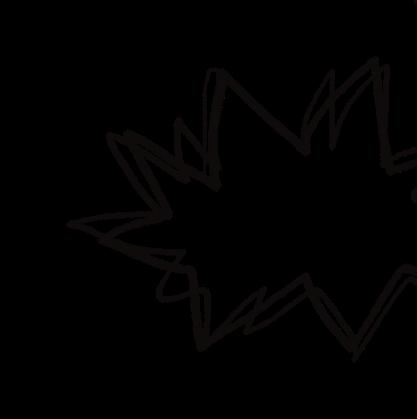
Misgendering “has recently emerged as [a] new frontier in the culture wars”, and has finally reached New Zealand’s shores. When I was commenting, I was unknowingly joining in on a war effort that spanned the Western world.
The scene set, the lines drawn, let’s discuss the interesting phenomena I noticed whilst I mindlessly refreshed my notifications for the next conflict.
THE FURRY DEFENSE
By far the most common rebuttal was something I term ‘The Furry Defence’.
It’s a political strawman (or should I say fursuitman) which assimilates transgenderism as wanting to identify as a cat . The idea that trans-people are identifying as animals is not new. It stems from propaganda in America, and has been spread by sites such as the Daily Mail, Fox News, and anyone looking for a quick piece of outrage bait to misinform their viewers. And it was an idea which got brought up a lot. Seems a lot of people are worried about how trans-people “wanna piss in trees then [at] school start meowing like a mentality [sic] ill person”. They never responded to my plea to Google what a furry was, nor provided a source.
Why are transgender issues so commonly rejoined with “I won’t treat you like a cat?”
SO THIS IS HOW THE NEWS DIES, WITH THUNDEROUS APPLAUSE
Another thing I noticed was the commenters who were excited for the impending shutdown of Newshub, and the job cuts at TVNZ
The distrust and active vitriol aimed at journalism isn’t surprising—there is a vested interest from rightleaning groups to discredit any and all media aimed at reporting pretty much anything.
With such hits as “News.orgs up for the chop proving once again why it’s a good idea”, and “can’t wait for you guys to close down”, it was not enough that trans people dared to desire basic respect—it was an insult that anyone would report on it at all.


features ahuatanga


ALL ENGAGEMENT IS GOOD ENGAGEMENT
So where was RE:News ? I was bleeding out on their front doorstep. Where was the platform that describes itself as “a platform that helps people get heard”, and the proud creators of “Queer Academy”?
No fucking clue.
I attempted to reach out to RE:News about moderating or disabling their comments. Unfortunately, their website Contact Us page doesn’t work. I then tried TVNZ, and haven’t heard back. I sincerely doubt I will.
The comments under this post are triple their average engagement.
To report stories about trans people, and then refuse to moderate the comment section, is to use transgender people as bait for engagement. There is no way to claim to be a safe platform when you engage in such practices.
This is not a critique of RE:News. I believe the lack of moderation ties into their cuts, another reason why it’s such a blow to Aotearoa. Without proper resources, it’s impossible to ensure articles are received the way they’re intended.
That being said. Once you have reported about an atrisk group, you become responsible for your impact on that community. The idea that another trans person could open the comments on an article about trans people, and see it’s full of hatred, is extremely demoralising. If RE:News lacks the resources to moderate comments—they should disable them. Reporting on transgender issues should not come at the expense of hatred.
I want hate comments to cease. I want reliable and ethical reporting of the issues that affect my community, without paying the price in discourse. I want to beat my sword into a ploughshare.

But until I wake up and find my notifications empty, I guess I’ll just keep commenting.


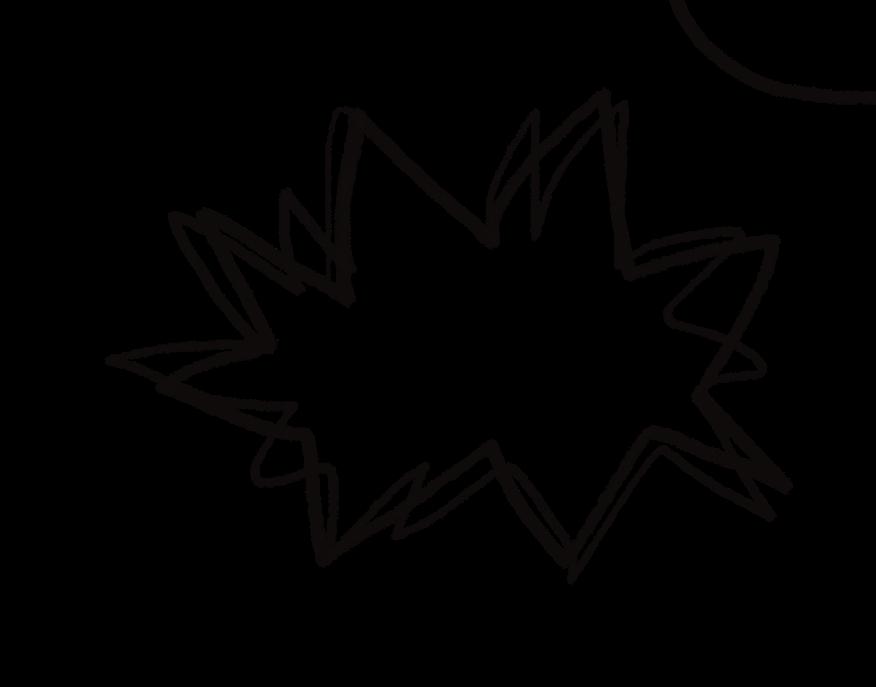
features ahuatanga page 15

Being a transgender Christian is, in the balance of things, pretty weird. Apart from being in the eye of the current culture wars, Christians and trans people are two demographics with very strong opinions of the other. Sitting in the middle often feels like being talked at by two camps who both find your existence incomprehensible.
A Queer Faith
(Trans Abundance in the Anglican Church)
Lovingly interviewed by Gilbert Ostini (he/him)
Instead of writing a defensive screed to either camp—both full of people I love, and people I struggle to get along with—I thought I’d go talk to my friend Jay.
We catch St Peters’ Good Friday service together, then head back to her apartment for a cuppa; a strong, spicy peppermint blend, while seagulls wheel and cry above the thirteenth floor.
page 16 features ahuatanga
features ahuatanga

Jay is a trans woman, an engineer, a public servant, and a committed member of the little Anglican church where I worship. Similarly to me, she grew up constantly proximate to religious communities—her father is Jewish, her mother “from Presbyterian mission stock”—but only really found her faith towards the end of high school.
At the same time, she was becoming aware of her queerness.
“Certainly at least in the Presbyterian Church,” she says briskly, “you can’t be openly queer and Christian. A lot of the rhetoric, when it comes to gender, was ‘oh, you’re treading into sin’. Wanting to transition or looking into that? That’s sin. You want to look into hormones? That’s sin. You just need to pray hard enough, and God will take all of this away.”
In my all-girls Presbyterian/Methodist high school, our Christian Ed lessons regularly featured the phrase ‘hate the sin, love the sinner.’ But what does this mean when the ‘sin’ is, as Jay phrases it, “not a choice, or an action, or a bad pattern of behaviour,” but something inherent? I recall asking a youth leader what the Bible had to say about transgender people (for a friend, of course). Looking dismissive and confused, her answer was, “that’s not God’s plan for the world.”
Jay points out the strong correlation between how she sees herself as someone who is both queer and disabled. For her, these ‘imperfections’ are a “part of God’s way of me being a blessing to people.” Imperfection, she clarifies, in the sense that “you might not necessarily stack up neatly with how everything else is, or you might not necessarily be able to work in an environment that other people can function in well.” But to her, Jesus “is with the people who seem the least put together.” Her differentness helps her feel closer to God, and to have an affinity for people outside what church and broader society consider ‘the norm’.
Han Koehle writes that “Queer says no, you cannot insult me by lumping me in with the most marginalised and scandalous among us. I am unabashedly for
their quality of life and not just my own.” Koehle’s expression of radical community links these questions of positionality and praxis—what are we going to do with our faith? We actually believe in a non-metaphorical God, but faith is also a way of structuring our doing good, loving and working with the understanding that, as Jesus says, “Whatever you do for the least of my people, you do for me.”
This grounded, practical empathy has clearly carried across to Jay’s work and study. As well as being a proud public servant, her PhD will look at how to embed and enshrine Māori data sovereignty in engineering practice.
When asked if she could explain her work so an English major might grasp it, Jay says her overall goal is to find a system of engineering practices that allow government “to not just give lip service to upholding the mana of tangata whenua, but actually embed and enshrine at a practical level. How do we do this right? What are the principles we need to follow at a day-to-day level?”
“We’re not just trying to do it in a tokenistic way… A degree of repatriation of data is not sovereignty. Nor is it co-sovereignty. Just because you have [data] onshore does not mean that iwi Māori have sovereignty or that we are being good kaitiaki of their taonga.”
It sounds like she’s talking about power, in both individual relationships and big systems.
She agrees, and says that university is a place where she feels equipped to “speak truth to power … We cast light through context, background and analysis onto what is happening in society. What are the power structures, invisible or visible?” She laughs.
page 17
“As an engineer, I still know about Foucault.”
This question of power is pertinent; existing at the queer/Christian crossroads means having the social disadvantages of queerness while still inheriting some of the privilege attached to big church institutions.
But our marriages, Jay points out, are still not equal. A blessing is not the same, legally or spiritually, as a church marriage. And whether Jay or I could become priests is a veritable mess of technicalities and church politics. Sometimes I wonder how Jay can stand the bureaucracy of the public service and the Anglican Church.
She’s slightly more inclined to shrug than I am. “One of the beauties of being trans and Christian is that we learn how to make peace with the imperfect institution.”
“We learn how to make peace,” I say, “but we also learn how to make trouble, which is what I’m trying to lean into at the moment. I think we could stir a little more shit.”
There is plenty Jay wants to burn down. And both of us still hold valid frustration and bitterness about the Christian spaces we grew up in. Some of that frustration is productive, driving us to challenge unjust church and social structures—but we can’t just
“Not that I’m condoning arson, but if you’re gonna burn something down, you’ve gotta plan what you’re going to do in its place,” Jay says. She draws attention to the period of Lent we’ve just come out of: a season of remembering that, “We come from dust and then we will return to the earth. Well, our physical bodies will return to the earth. So what are you doing in that season to community sit at the heart of this planting: clearing out broken relationships and old ways of thinking, to plant something that will outlive and outgrow us.
STEALTH STEALTH
“Something good and just and enduring,” she agrees. letter laid down for us.”
page 18


STEALTH STEALTH
written by an Anonymous Trans Woman (she/her)
When a trans person doesn’t tell anyone that they’re trans, and lives their life ‘passing’ as a cisgender person, that’s called being stealth.
A lot of cisgender people I know take issue with trans people being stealth, even a few trans people do. Apparently, there’s something unauthentic about being stealth. You’re ‘hiding your true self’ from the world around you, from your friends, your family.
What I think these people don’t realise is that, for a lot of trans people, it’s unsafe to be out as trans. Especially for brown trans women like me.
I’m lucky enough that I’ve been medically transitioning for so long that I’m not ‘clockable’, which is here used as a term to describe when people ‘can tell’ when you look trans, (you can’t, by the way.) I’m lucky enough that when I moved to Wellington, my name and gender legally changed, I didn’t have to tell people that I’m trans. So I didn’t. I never have, except for a few very close friends.
You see, in my hometown, I was bullied ruthlessly for being transgender. I have been called so many names, and I have been beaten a few times, too. Once, I nearly lost a tooth. I’m not tall, I’m not strong. I’m the girliest girl you could possibly meet. And I’m so grateful that people like that can’t tell I’m trans anymore, because as much as I love being trans, as much as I love our community, if I am out I feel unsafe. I know that the world has changed a lot
and that there are so many more accepting people compared to transphobes now, but that doesn’t change my anxiety.
It’s a privilege for me to be able to be stealth. I know a lot of trans people, specifically trans women, who can’t be for a multitude of different reasons. I’m so glad that I’m able to be safe, and yet my heart breaks for them, because I wish they could, too.
It is not a trans person’s responsibility to disclose to you whether or not they are trans. And if you ‘couldn’t tell’ someone was trans when you first met, don’t bring that up to them. Somebody ‘looking’ trans implies that trans people have a stereotype, and sure, there are definitely stereotypes, but I assure you that telling someone that you didn’t know they are trans doesn’t make them feel good about themself. In fact, it probably makes them feel uncomfortable.
I look like a beautiful brown woman, I am a beautiful brown woman. I just also happen to be trans. I live my life authentically, I’m not hiding my true self from anyone. My being trans is a big part of me, but not so big that everyone has to know.
I’m really sorry to cisgender people who feel so insecure within their own gender presentation that they just have to know whether or not people are trans. I assure you, there’s quite a few of us you’ve missed. x
page 19 features ahuatanga
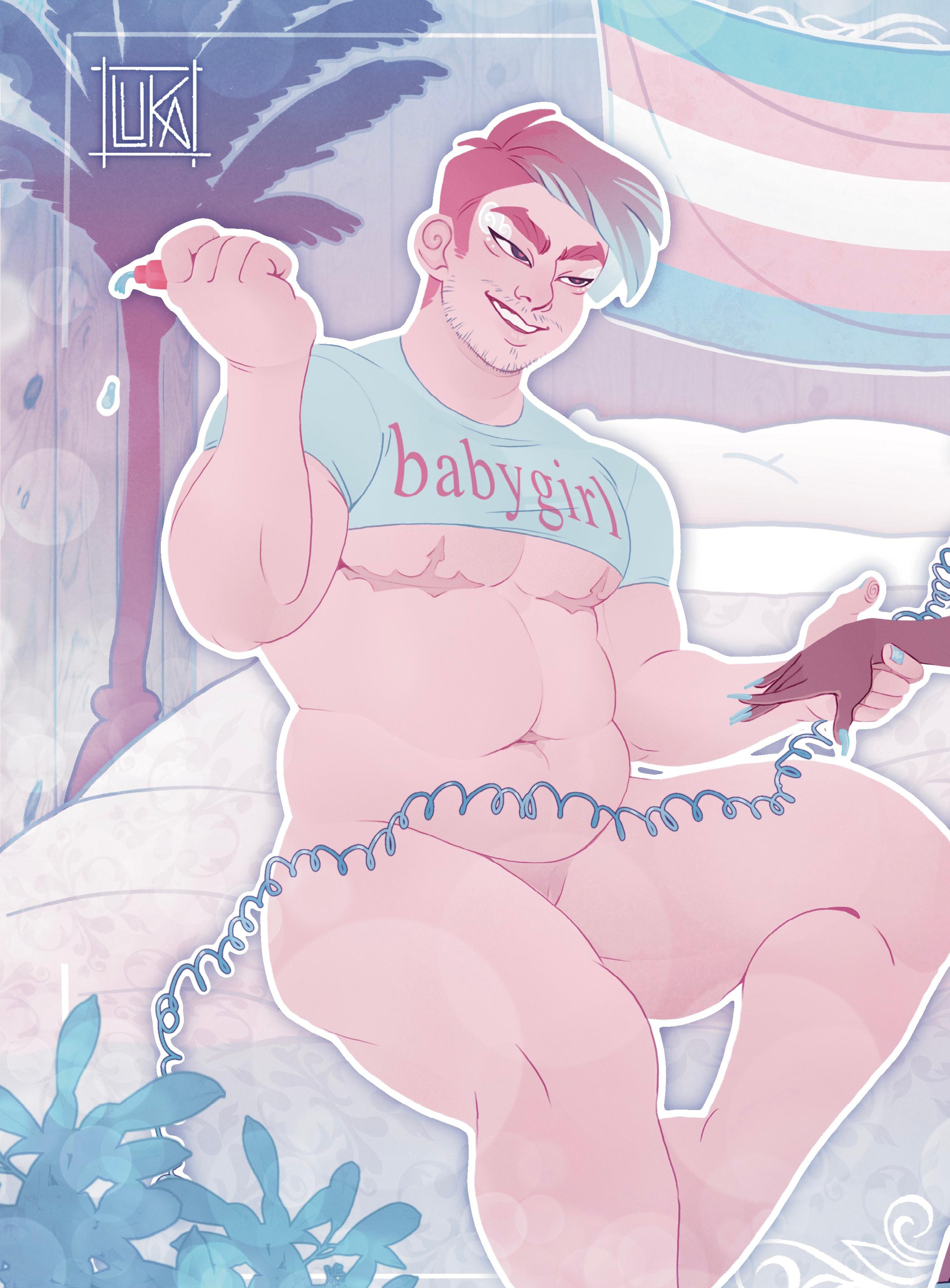
salient.
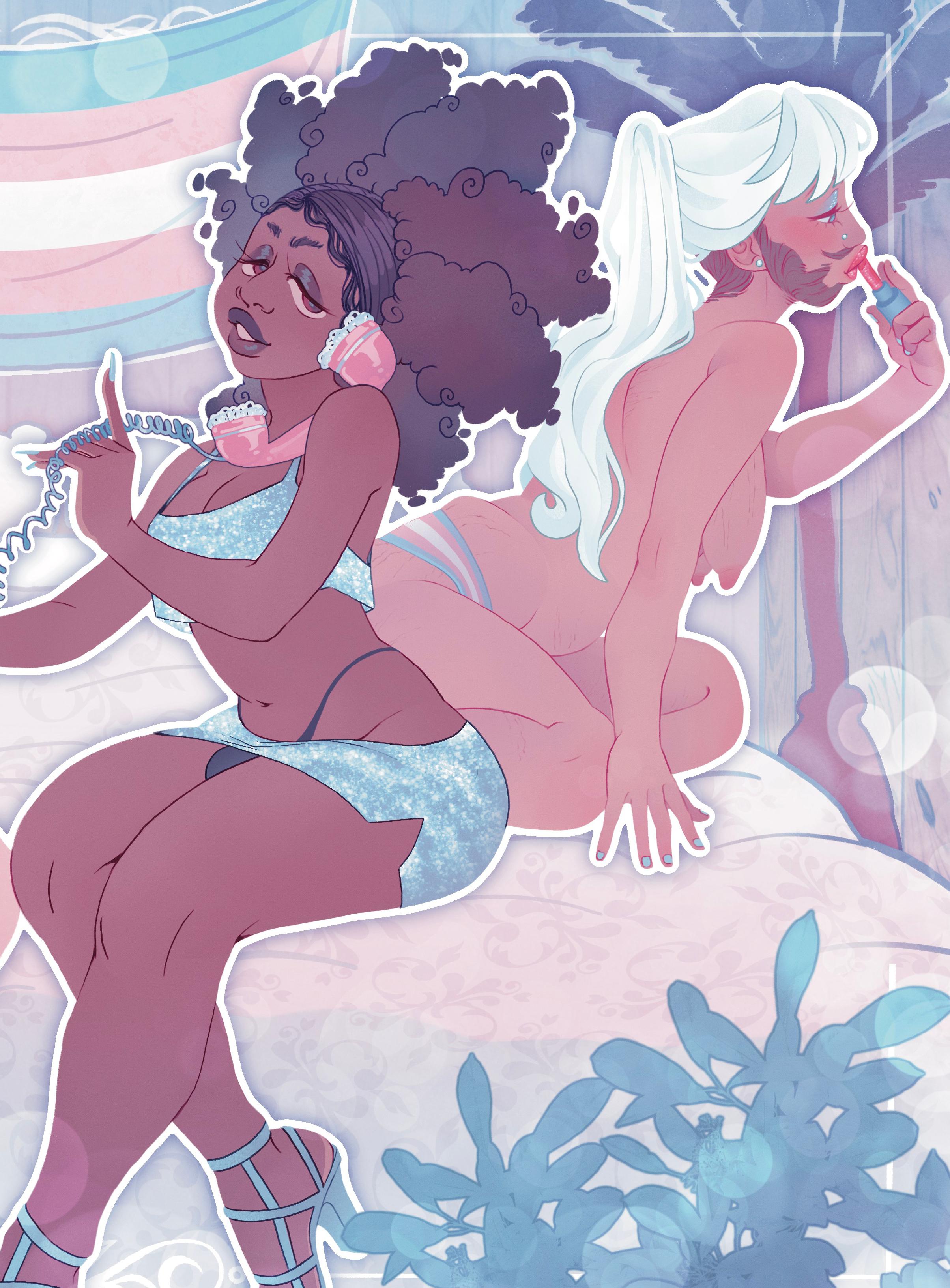
07 TRANS RIGHTS
Musings of a Modern Māhū
mused by Mauatua Fa’ara-Reynolds (she/they)
Coined by the Niuean human rights activist Phylesha Brown-Acton, MVPFAFF+ is essentially the Pasifika equivalent of LGBTQIA+, acknowledging the incredible myriad of gender identities in the Pacific. It stands for Māhū (Hawai’i and Tahiti), Vaka sa lewa lewa (Fiji), Palopa (Papua New Guinea), Fa’afafine (Sāmoa), Akava’ine (Cook Islands), Fakaleitī (Tonga), and Fakafifine (Niue). And, of course, the '+' represents identities from other regions and islands. These identifiers do not have clean-cut English equivalents; they’re culturally specific terms.
Because of the intersection between race and gender/sexuality, MVPFAFF+ erasure occurs on several fronts. We are neglected in our heteronormative settler-colonial society, ostracised by our own communities (thank you, Christianity), and also othered in Western LGBTQIA+ spaces. Moving forward, we need culturally specific terminology that acknowledges the intricacies of indigenous queer identities. We also need
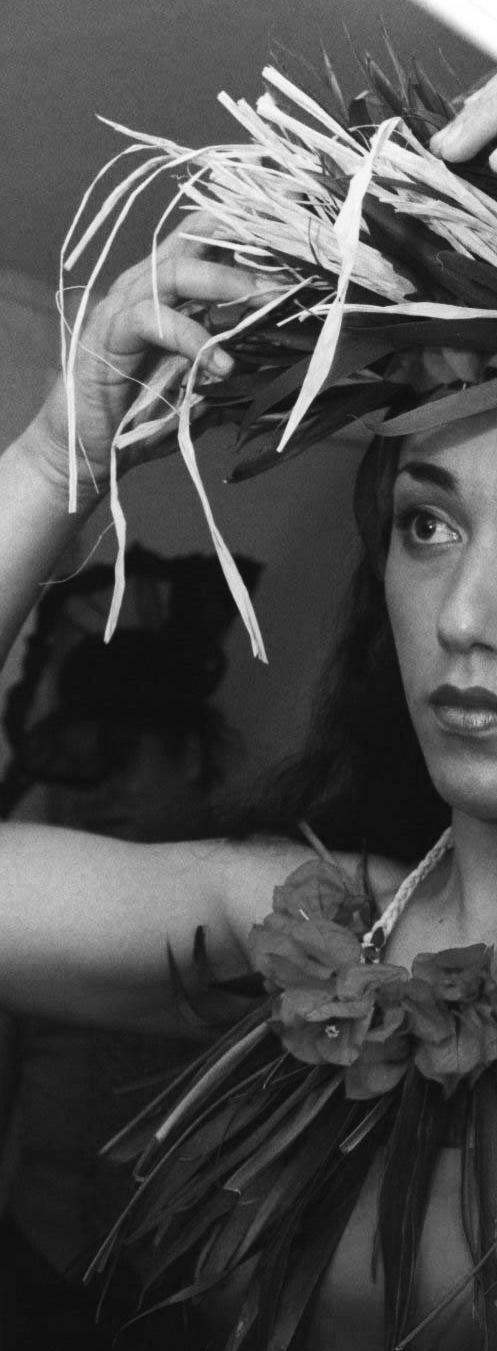
page 22
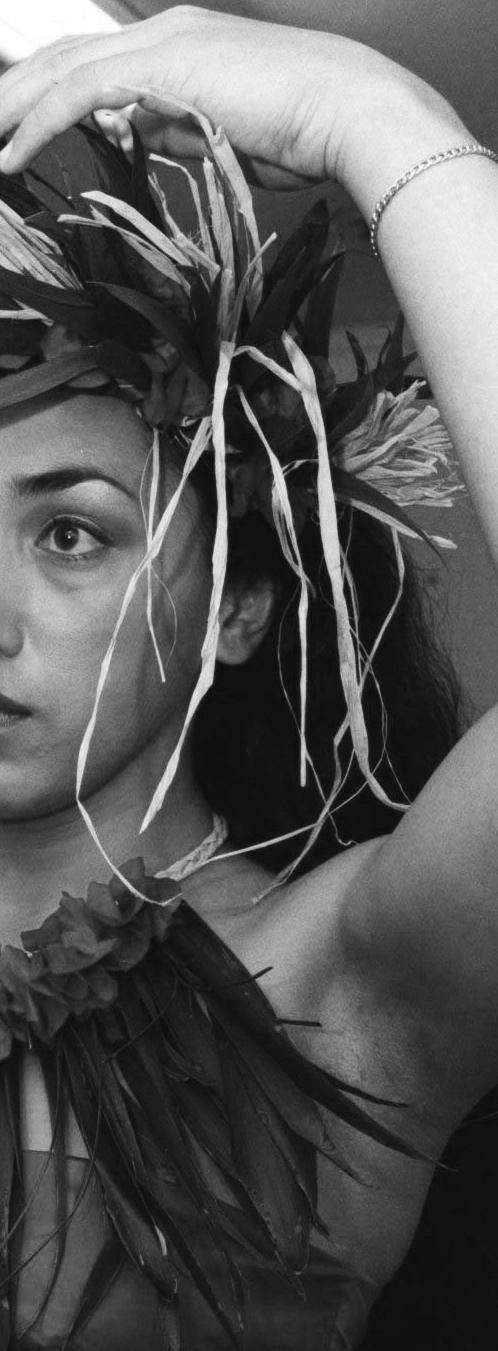

representation of these identities so that they’re more widely validated and appreciated by nonPasifika. So now, without further ado, I present my people, māhū Mā’ohi.
During early European contact, māhū was used to define what we’d consider (in the Western world) a transgender woman or a gay man. Now, amongst Ta’ata Mā’ohi and Kānaka Maoli, māhū is used to refer to all non-heteronormative or cisgender identities. Within te ao Mā’ohi, māhū play vital social, cultural, and spiritual roles. In familial settings, many māhū are fa’a’amu parents, similar to whāngai in te ao Māori. Culturally, they’re often extremely talented dancers, choreographers, and costume designers. And, not to toot our own horn, but we’re also considered to be a product of divinity. Since we have both feminine and masculine spirits, our mana is extremely tapu, and we’re thus considered to possess God-given abilities.
Despite our contributions to the social fabric of te ao Mā’ohi, British and French settlers saw māhū as abominable and beastly, therefore warranting our subjugation. Colonial powers in Mā’ohi Nui sought to control morality (as colonisation often does), and due to the perceived link between morality and sexuality, māhū, who epitomised sexual deviancy, became a prime target. Thus, in 1842, the Pōmare Code was introduced, prohibiting same-sex sexual activity (even though members of the monarchy had open sexual relationships with people of the same gender). And, because gender and sexuality are so intertwined in the Pacific, one can imagine that this extended to non-conformist gender expressions, too.
In his piece “The Queer Third World” (2020), academic Ilan Kapoor discusses how colonisation involves an intentional construction of the Third World as queer, effeminate, and sexually perverse, thus reinforcing the West’s paternalistic and masculine status. Ashamed and embarrassed, the Third World attempts to ‘unqueer’ itself, which is evident in the structural implementation of heteronormative ideologies (e.g. homophobic laws and policies) and in intra-communal relationships. In the context of Mā’ohi Nui, the queering of our people has meant that many Mā’ohi have internalised the idea that māhū is something of a freakish identity that serves as a reminder of our defeat and inferiority.
page 23 features ahuatanga
PICTURED: Phylesha Brown-Acton; photographed by Glenn Jeffery, 1999; The New Zealand Herald.

My family back in Tahiti never talk about māhū unless it’s an uncle having a giggle at an effeminate tāne on the street or an aunty giving a dirty look to the ageing māhū on the sidewalk wearing lipstick. Thus, my introduction to māhū came from family members dismissing and ridiculing them. So, I repressed any feelings of discomfort I had around my gender identity or sexuality because I knew in family settings, I’d probably experience something similar. And God forbid I disappoint my feti’i.
The last time I was in Tahiti was for my Mum’s work at the cultural centre, where they were holding a tapamaking workshop. There was one tapa-maker who I was absolutely captivated by (I should also clarify I was 15 and still learning about queerness and how I fit into it). They had short black hair, a gold nose stud, a deep but soft voice, and wore a muscle tee with low side cuts, revealing a light brown binder.
This was my first time meeting a visibly queer Tahitian
transmascs or lesbians in Mā’ohi Nui, due to the fact that there isn’t really any mention of them in any historical records—this is just a big fat stupid lie. Absence does not mean non-existence. Just because white men in the 1800s didn’t write about us in their silly little diaries doesn’t mean we weren’t there. Because I exist, don’t I? So surely they existed too? My tūpuna were queer as fuck, and so were yours—we have always been queer.

my cultural identity can coexist with my queer identity, and being queer doesn’t mean I have to leave my culture behind

people in the context of globalisation and the spread of Western ideals of being/acting/doing, is the tension between the ‘global gay’ and ‘traditional’ expressions of gender and sexuality.
I’m not transgender, nor non-binary, nor pan-sexual. These labels don’t
In the same vein, queer indigenous people are so often invisible in queer spaces, because they’re so dominated by pākehā and pākehā expressions of queerness. I’ve never really fit in in these spaces. And it’s partly because I’m still figuring out my queerness, partly because I’m not visibly queer or fit neatly into any of the LGBTQIA+ categories, and partly because in those spaces, I’m one of the few people that looks like me. Not only am I often physically different, but my expression of my queerness is too. And thus, another issue that emerges for Indigenous who wasn’t a gay tāne or transgender vāhine. At the time, I thought those were the only queer identities that existed in Mā’ohi Nui, of which I was neither. So, because I felt that there was no place for me, I thought I’d have to surrender my cultural identity and adopt the Western framework for gender and sexuality. In some ways, this made me feel like a traitor, that I’d be rejecting my people in favour of whiteness and becoming the worst thing a member of the diaspora could be: culturally inauthentic.
But meeting that queer tapa-maker was monumental in helping me realise that (of fucking COURSE) my cultural identity can coexist with my queer identity, and being queer doesn’t mean I have to leave my culture behind. In fact, my culture has a very special place for me, in which I’m deeply valued and cared for. But it took a chance encounter for me to learn this. Because academic literature, mainstream media, and common cultural knowledge never gave me (and probably never would) the opportunity for self-discovery.
If you try researching māhū (whether it be historical accounts or contemporary ethnographies), you’ll find an extremely limited body of work about transmasculine or lesbian-adjacent Mā’ohi. In some texts that I’ve read about māhū, authors have gone so far as to suggest that there were (and are) no
really apply to me, so when I’m in these spaces, I can’t properly identify and position myself. Which I recognise can make people a bit uncomfortable, since I seem like a cishet woman intruding on a safe space; a privilege in itself. But I should clarify that my queerness is primarily internal, not only for safety but for cultural reasons. And just because I don’t externalise my queerness (at least in conventional ways) doesn’t mean I’m ashamed or disapproving of my queerness. Absolutely not. I’m just māhū, and I embody queerness in a non-Western way.
Now that we’re starting to make progress in dismantling colonial control and demolishing the binary, more and more young people are reclaiming indigenous gender identities and sexualities. And to call oneself māhū, takatāpui, vaka sa lewa lewa or any of those beautiful forms of being is an act of decolonisation and a refusal to let our worlds disappear.
That’s all from me. Stay sexy, stay safe, stay queer.

page 24
ahuatanga
features
xx
Lots of love, Your local māhū
Spotlight

Spotlight on Takatāpui Hosts Slay West and Olivia Dreams at Dirty Little Secret

Nestled in the lively core of Wellington's entertainment hub is Dirty Little Secret, a rooftop bar that buzzes with energy and acceptance. Leading the charge at this cultural spot are the Takatāpui hosts, Slay West and Olivia Dreams, who have injected new life into the bar's quiz nights with their vibrant personalities and local touch.
Performer Slay West explains:
“I love performing at DLS as most of heterosexual people or baby queer human first drag shows or first time seeing a very queer performance art. In NZ there aren't many places to see queer art unless you live in a big city. Small towns are very shut off so when new students from small towns come out they get to witness amazing queer / POC artists for the first time in Wellington. Having this awesome and free event(s) is great for so many people. I love educating new people about queer culture and drag culture. I have so much fun with the crowd and the staff at DLS are top tier. They make me feel very safe.”
Dirty Little Secret's trivia nights can be traced back to 2023, when the Bombay Bombshell, a resident performer and host, first introduced the concept. Following the success of their Drag Bingo nights, the bar's management decided to expand the festivities to Wednesday evenings.
In line with their commitment to promoting local artists, the bar regularly features performances from DJs, musicians, and drag queens, embodying their inclusive and accessible philosophy. The pioneering presence of Felicity Frockaccino, a Takatāpui drag queen of Ngāi Tahu IwI, paved the way for drag to become an integral part of Dirty Little Secret's events, highlighting diverse voices and showcasing homegrown talent.
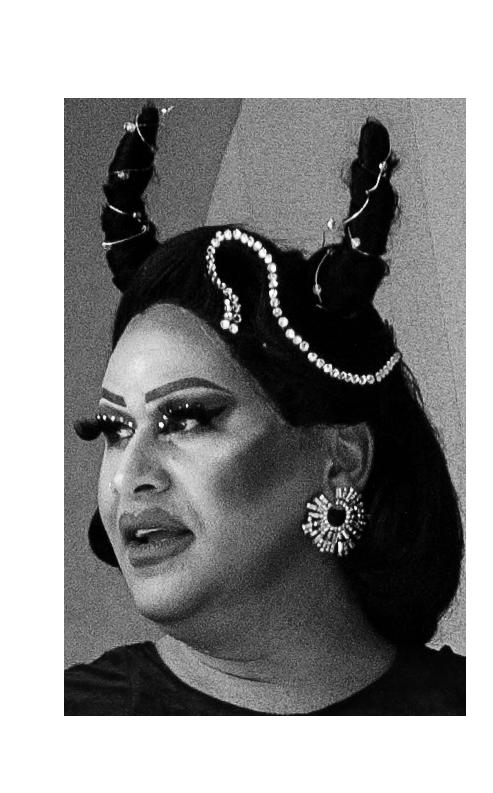
Selina Simone played a crucial role in the evolution of Dirty Little Secret. She was the driving force behind shifting the focus towards showcasing local talent in quiz production. Recognizing the disconnect between the quiz content and the lively atmosphere of drag events, Simone pushed for a more community-focused approach. As a result, in 2024, Slay West and Olivia Dreams were brought on as hosts, embodying both local authenticity and inclusivity. Alongside local quiz writer Constance Craving, the team has transformed the quizzes, making them more relatable to patrons and performers alike.
By providing free entry to quiz nights, Dirty Little Secret demonstrates their dedication to making the venue inclusive and community-driven. Simone's vision for the establishment goes beyond financial considerations, ensuring that people from all backgrounds can join in on the fun and enjoy the breathtaking view of Pōneke's night sky.
Looking ahead, Simone envisions a future where quiz nights continue to thrive, providing a platform for underrepresented drag artists, including drag kings, to shine. As the demand for local talent grows, so too does the potential for commercial success. By nurturing and compensating performers, Simone believes Dirty Little Secret's quiz nights will become a staple of Wellington's cultural landscape.
With Slay West and Olivia Dreams at the helm, Dirty Little Secret's quiz nights have undergone a remarkable transformation, embodying the spirit of community, creativity, and inclusivity. As the venue continues to evolve, it remains committed to celebrating local talent and providing a space where everyone can feel seen, heard, and celebrated.
page 25 arts & culture ahurea
highlighted by Phoebe Robertson (she/her)

Groove Garden
January - March
Allina by Smerz
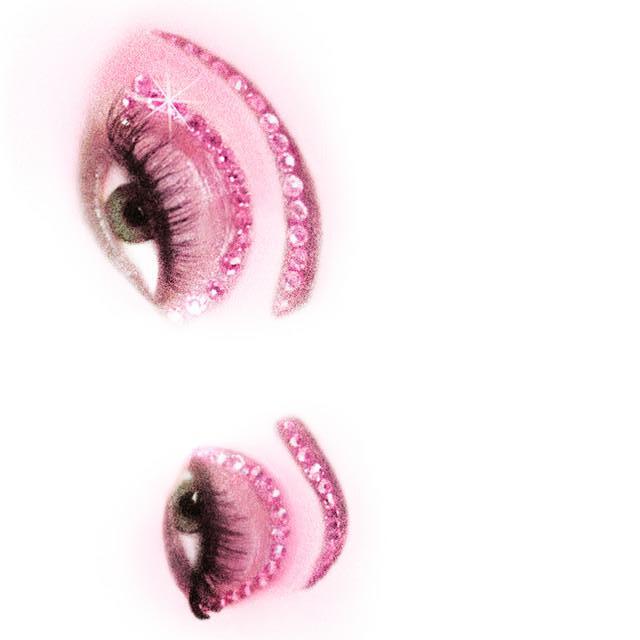
Fresh off of their collaboration with K-pop trailblazers NewJeans, Catharina and Henriette of Norwegian experimental duo Smerz unveiled the Allina EP: a 15 minute concept record loaded with 00s-era aesthetics of fame, excess, sensuality and trash-chic. Allina is a mega starlet to be idolised over. With spoken word passages between every track, her mystique and status are made oh so palpable. Such is her glitz and glam, made more tangible through booming, in-yourface, cheeky production. The vocal performances too are direct, slinky, and delivered with a wink. It’s such a succinct and fun EP, with so much nostalgia towards the divas and music of our childhoods. A truly perfect homage to that paparazzi/tabloid age of crazed stardom.
Listen if you like: Peaches, Ciara, Tirzah
Genres: electropop, 00s R&B, electroclash
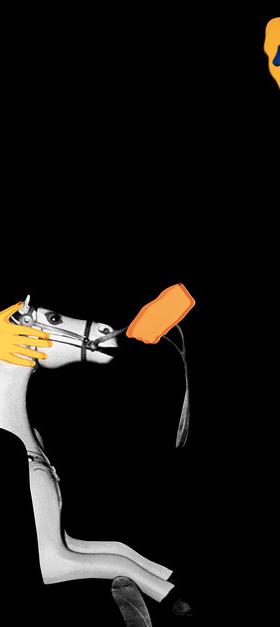
Loss of Life by MGMT
If you’d have told me a couple of years ago that I’d be writing about an MGMT album being one of my favorite albums of the year, I probably wouldn’t believe you. There’s just something about the sentiments scattered throughout Loss of Life that really resonate with me. I love the liminal space this album inhabits. It’s quite hypnotic, providing a psychedelic style of rock and electronics that is easy to get lost in. Thematically, the record explores the meaning of life, and the emotional waves that you feel throughout your lifetime. It’s sentimental, surreal, existential at points, but deeply earnest and heartfelt.
Listen if you like: Animal Collective, The Flaming Lips, Beach House, Tame Impala
Genres: psychedelic pop, progressive pop, indie rock
She Reaches Out To She Reaches Out To She by Chelsea Wolfe
Having never listened to Chelsea Wolfe prior to this record, I had no idea what to expect going into this. What I got blew me out of the park. Despite how cold, nocturnal, and doomed it sounds, this album is anything but. She Reaches Out… is about the process of overcoming hardship, and standing victorious at
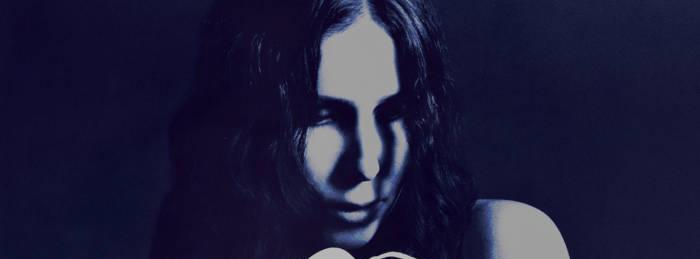

curated by Xavier Farrow-Francis (any/all)
the end of all the shit you’ve endured. Wolfe sings near-incantations on every track, with a weathered strain that is so empowering to listen to and take in. All the while music growls and crunches, through slumbering bass and crisp drum arrangements. This album has a determined punch behind every beat, and regardless of its abstract nature I think anyone could sense how strong it is.
Listen if you like: PJ Harvey, Portishead, Nick Cave
Genres: darkwave, trip hop, industrial rock
Still by Erika de Casier
I think Erika de Casier has got to be one of the coolest working musicians today. Her third album Still arrives after her mega-collaboration with NewJeans (Erika and Smerz are good friends), and she wrote and produced the majority of the album while touring the globe. She’s booked and busy, but she remains humble and reserved. She’s still just a human dealing with everyday life. Somehow she’s able to make doing laundry and replying to emails sound sexy through her slick and soulful production, and gentle vocals. Toss a handful of fantastic features into the mix, and you’ve got a killer R&B record. Don’t let Still fly under your radar.
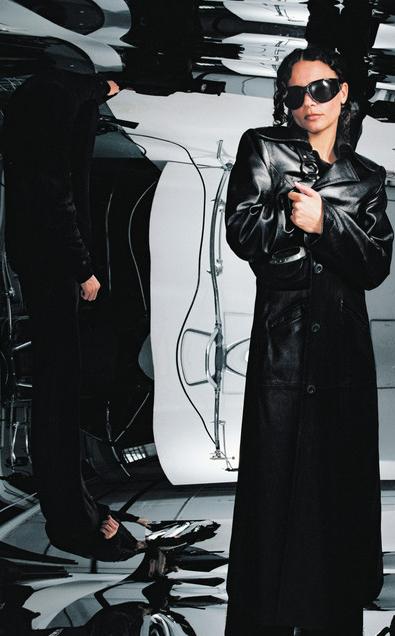
Listen if you like: Destiny’s Child, Brandy, Shygirl
Genres: R&B, hip hop soul, downtempo
Sarcologue by TOČKA
TOČKA (pronounced totch-ka) is one of Pōneke’s most emotionally profound and unique producers working right now, and their new full-length Sarcologue makes that evident. Track after track, TOČKA crafts elegant and delicate beds of instrumentation with glacial bells and pianos, or haunting taonga pūoro. These whimsical soundscapes are enriched with stark electronic textures that whir behind and all around the more classically minded parts of the music. Sarcologue challenges your ideas surrounding classical and experimental music, and provides an unparalleled emotional experience. It’s an incredibly rich and dense project that I cannot recommend enough.
Listen if you like: Arca, Autechre, Ryuichi Sakamoto
Genres: post-industrial, dark ambient, modern classical
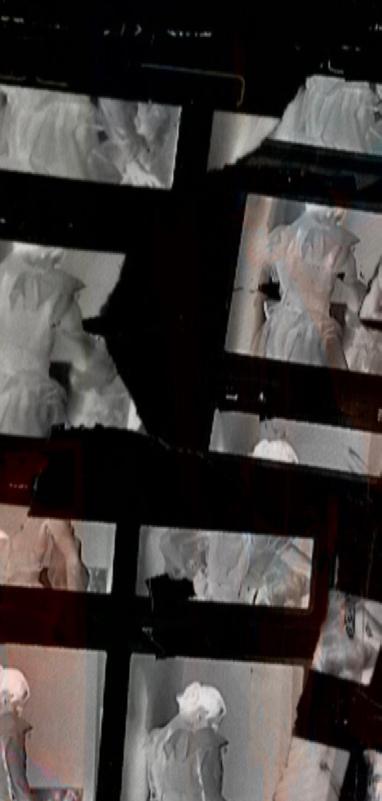

page 26

Did you know there’s girldick in the Louvre?
words by Goose (she/they)
It’s true. Check it out:
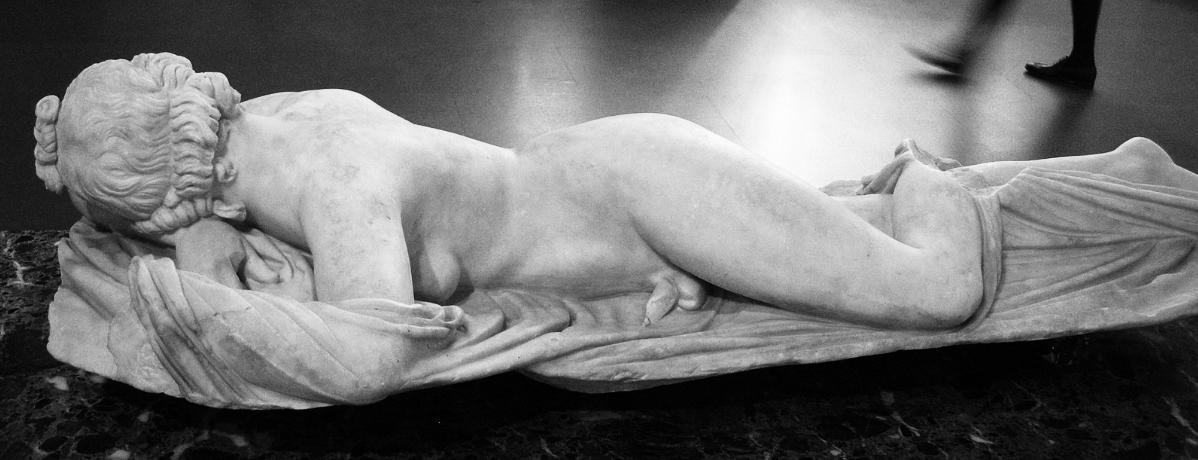

Isn’t she pretty? Look at her, so peaceful. Just a girl taking a nap. Wish I was brave enough to nap in public.
She’s called the Sleeping Hermaphroditus. She dates back to Ancient Rome, but her original sculptor is unknown. The mattress she sleeps on in the Louvre was sculpted separately, by Gian Lorenzo Bernini in the 1600s. There’s also a copy of her in the Vatican, and a number of national museums around the world. In ancient myth, Hermaphroditus was the child of the gods Hermes and Aphrodite, born a handsome young boy and through divine shenanigans morphed into a divine being between genders. Her form is inspired by Venus, goddess of beauty, with a notable twist.
They aren’t the only trans-adjacent sculpture out there—frequent depictions of Dionysus/Bacchus in Greek and Roman mythology show the god of drink and partying as a genderfluid being, and most other gods have shapeshifted across genders once or twice in the old stories.
I remember seeing Hermaphroditus for the first time, scrolling absentmindedly through a Tumblr feed when all of a sudden she graced me with her presence. It was a revelatory moment—a soft “Oh, she looks a bit like me”, followed by “Oh, she looks a bit like me in the Louvre”. She’s a work of art, naked but not meant to be sexy, just a beautiful, resting body.
I feel a lot about her. I’ve written poetry about her, I need as many people to know about her as possible, to know and see that beautiful trans bodies have always been around, and even in ancient times we were seen as works of art.
page 27
Q
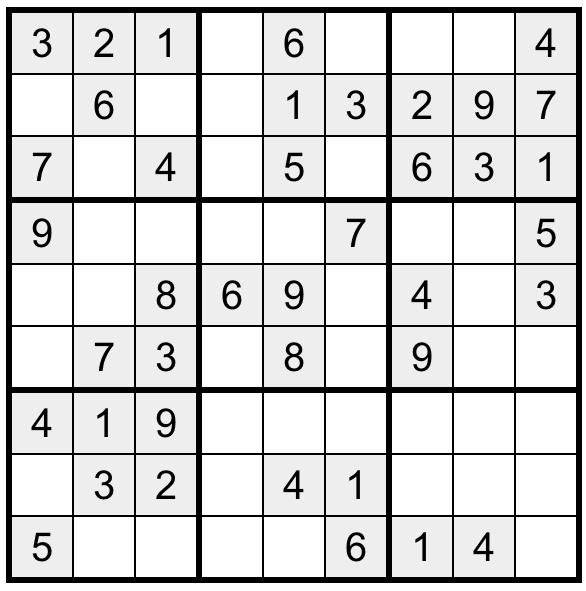
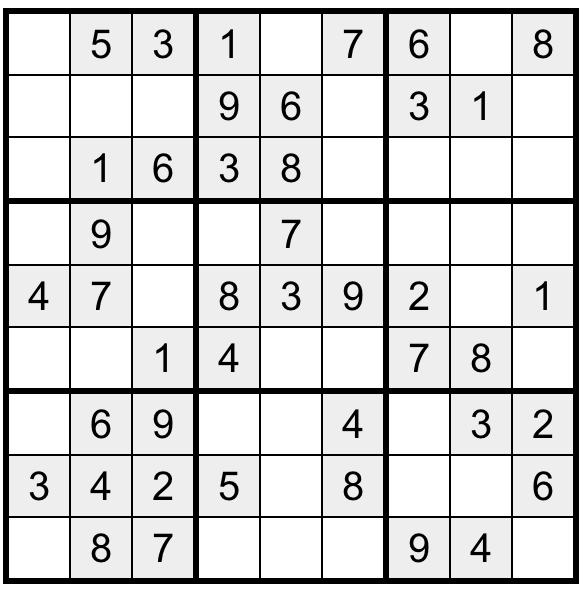

What is the capital of Finland?
What is the name of Bridget Jones' baby in the third Bridget Jones film?
Which five colors make up the Olympic rings?
In which decade was Madonna born?
What's the biggest animal in the world?

page 28
everybody's favourite page
PUZZLES
WEEKLY QUIZ 01 02 03 04 05
QUIZ ANSWERS 01. Helsinki ; 02. William ; 03. Black, green, blue, yellow and red ; 04. The 1950s (1958) ; 05. Blue Whale
Maze Puzzle


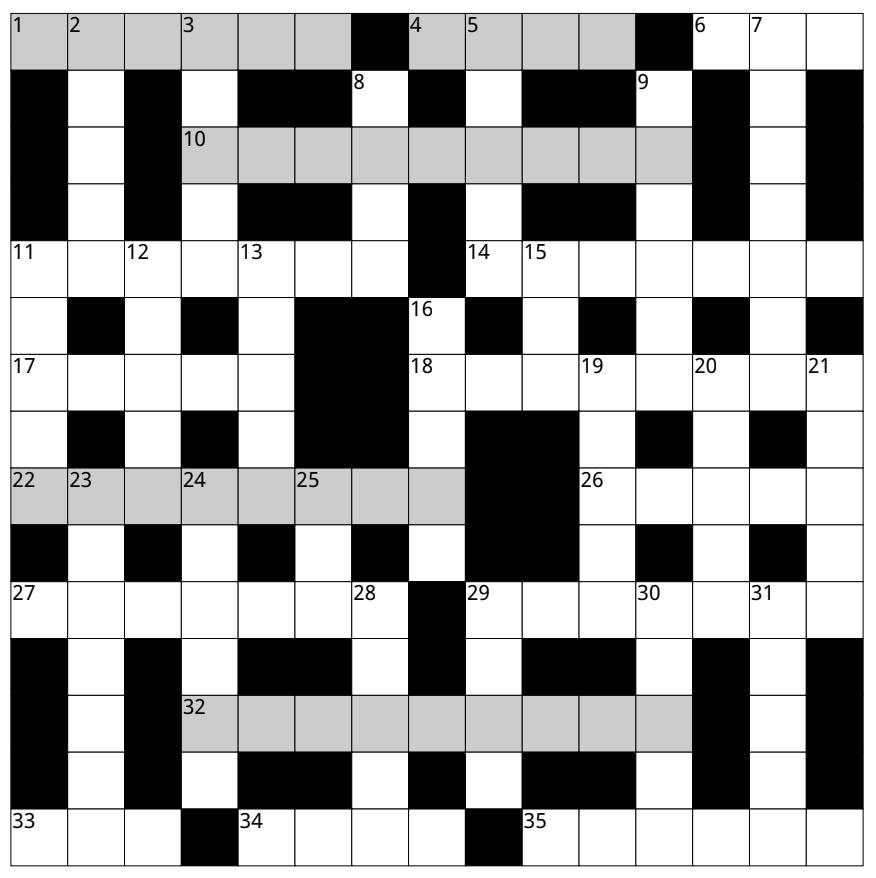
DOWN
2.

ACROSS
1. Someone who tells of impending danger (6)
4. Male siblings, informally (4)
6. Droop; acronym of Hollywood union that striked in 2023 (3)
10. More important than anything else (9)
11. "I dunno" (5, 2)
14. Parched (7)
17. Skin of a reptile or fish; like Rotten Tomatoes' "The Tomatometer" (5)
18. Court summons (8)
22. Washington's District (8)
26. Thespian; movie star (5)
27. King of fiction? (7)
29. "A clean burning fuel" Hank Hill (7)
32. Existing or occurring everywhere (9)
33. Charge; penalty (3)
34. With 35A, type of company that produces or distributes movies; a hint to the shaded clues (4, 6)
35. See 34A
WORD SCRAMBLE
How many words (of three letters or more) can you make from these letters (according to the Scrabble UK dictionary)?









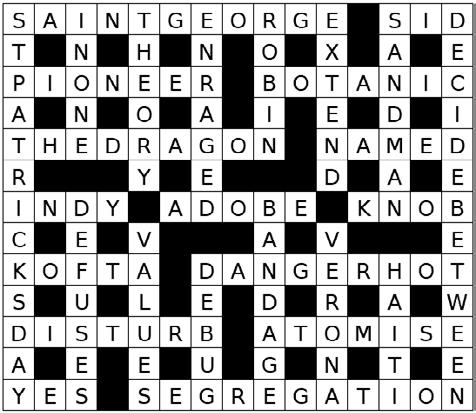
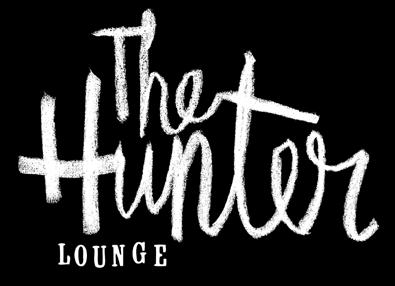
puzzles panga
(5)
Bite playfully (3, 2) 5. Perch (5)
Jennifer of Friends (7)
Term of endearment; 1995 movie about a pig (4) 9. Sound system; opposite of mono (6) 11. Simple & nonacidic? (5) 12. Be of use (5) 13. Water vapour (5) 15. Centre of activity (3) 16. Academy Award (5) 19. "Grand" instrument; Jane Campion movie, with 'The' (5) 20. An uncredited 26A (5) 21. Concur (5) 23. Scene left on the cutting room floor (7) 24. Disconnect (like a power cable) (6) 25. Spelling contest (3) 28. New; what many a screenplay is adapted from (5) 29. Role (4) 30. Ngerulmud's Republic; Micronesian island nation (5) 31. Prefix for many iwi (5)
Company behind Premiere Pro
3.
7.
8.
Good: 8 | Very Good: 10 | Excellent: 12+ CROSSWORD MADE BY NIL L C A M
R ISSUE 06 Crossword solution E B S The Puzzles are brought to you by The Hunter Lounge. For the best pizza, pool, and bevvies on campus, pop in on your next trip up the hill!
SILVER SCREEN

nonbinary, aroace, 4th year student at Massey University! For my piece on trans rights I honestly just wanted to convey trans joy, solidarity, and comfort within our own skin no matter what we look like. Though we may all be different and have different experiences, we are trans nonetheless, and we will support each other through thick and thin. You can find my occasional updates at @lou_gollum on Instagram.

You’re entering a point of change, your past actions don’t define you as long as you actively change for the better. Everyone is waiting for the next step in your evolution.
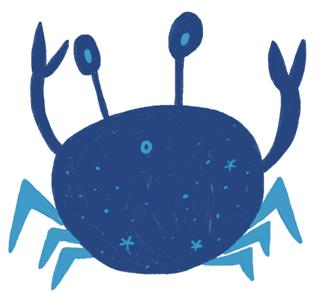
You got called out, didn't you. Sometimes we need to hold ourselves accountable for our unconscious actions, it's called growing and maturing.
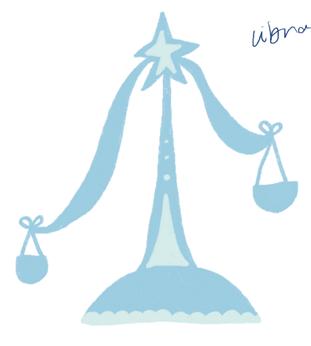

Aries Taurus Gemini Cancer Leo Virgo Libra Scorpio Sagittarius
You're being tested by the universe a bit. Remember good things take time, stay patience for whatever opportunities are ahead of you.
Capricorn
There's a difference between being a homebody and a Hermit, put yourself out there a bit more, say yes to plans for once.
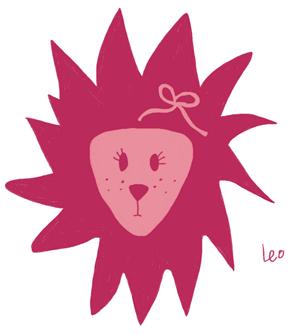
A Leo being a voice of reason, who would have guessed it. Shutting down stupid ideas isn't necessarily just being mean, it's called being practical.
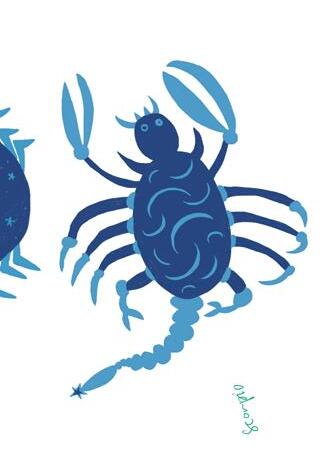
One door closing usually means another is about to open. Let yourself mourn any losses and then keep moving forward. You never know what's just round the corner.
Aquarius
You’ve got goals, nothing and no one will stop you from achieving them. One could say you're locked in for real. Don’t lock others out though.
Money issues, who is she? I’m seeing wealth coming into your life, whether that 's getting your bond back, finally getting a part time job, or finding $20 on the street.
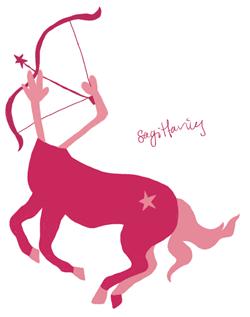
Work has been getting to you, too many hours, too little recognition. Burn out is near. You might need to find solace and support in the people around you.
Difficult challenges require creative solutions. The week ahead is going to test your ability to adapt, overcome and think outside of the box. Doing
Okay mother is mothering, we see you! It can take a lot of your own energy to nurture others

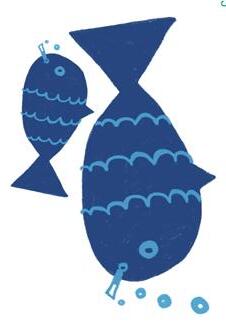
Pisces
Remember to not carry the world on your shoulders. You're not a beast of burden. Tap into your creative side to refill your energy.
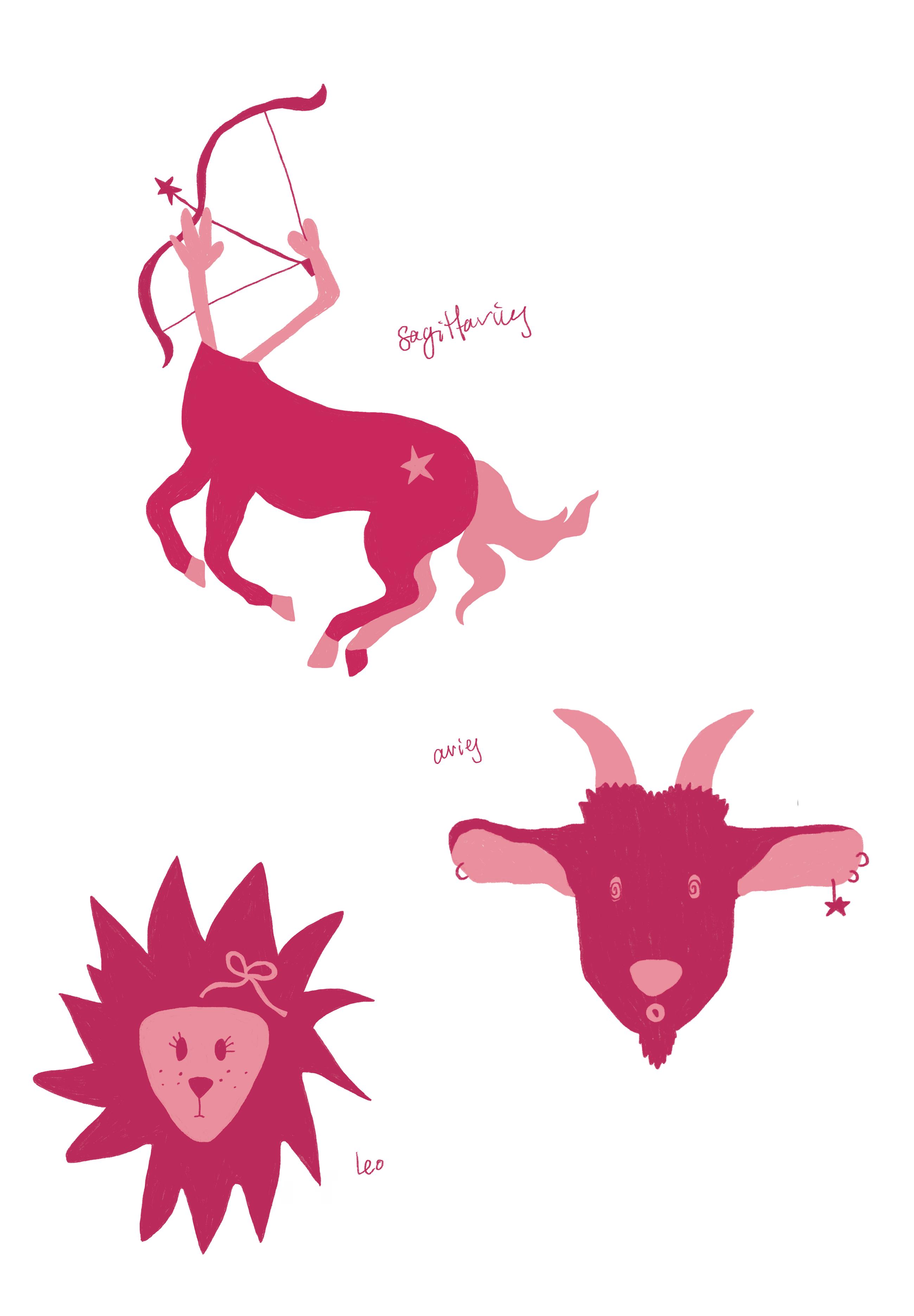
ARTIST
HOROSCOPES
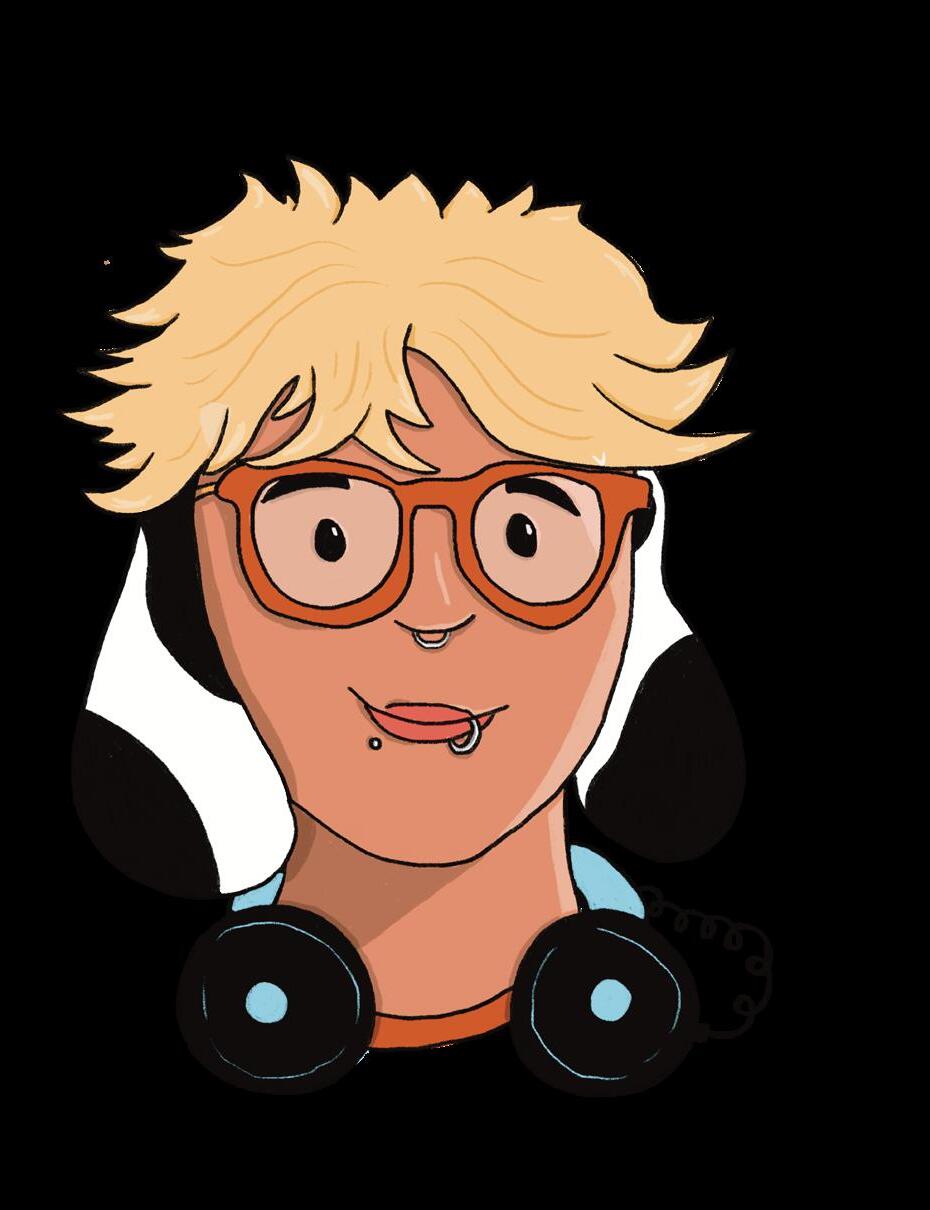

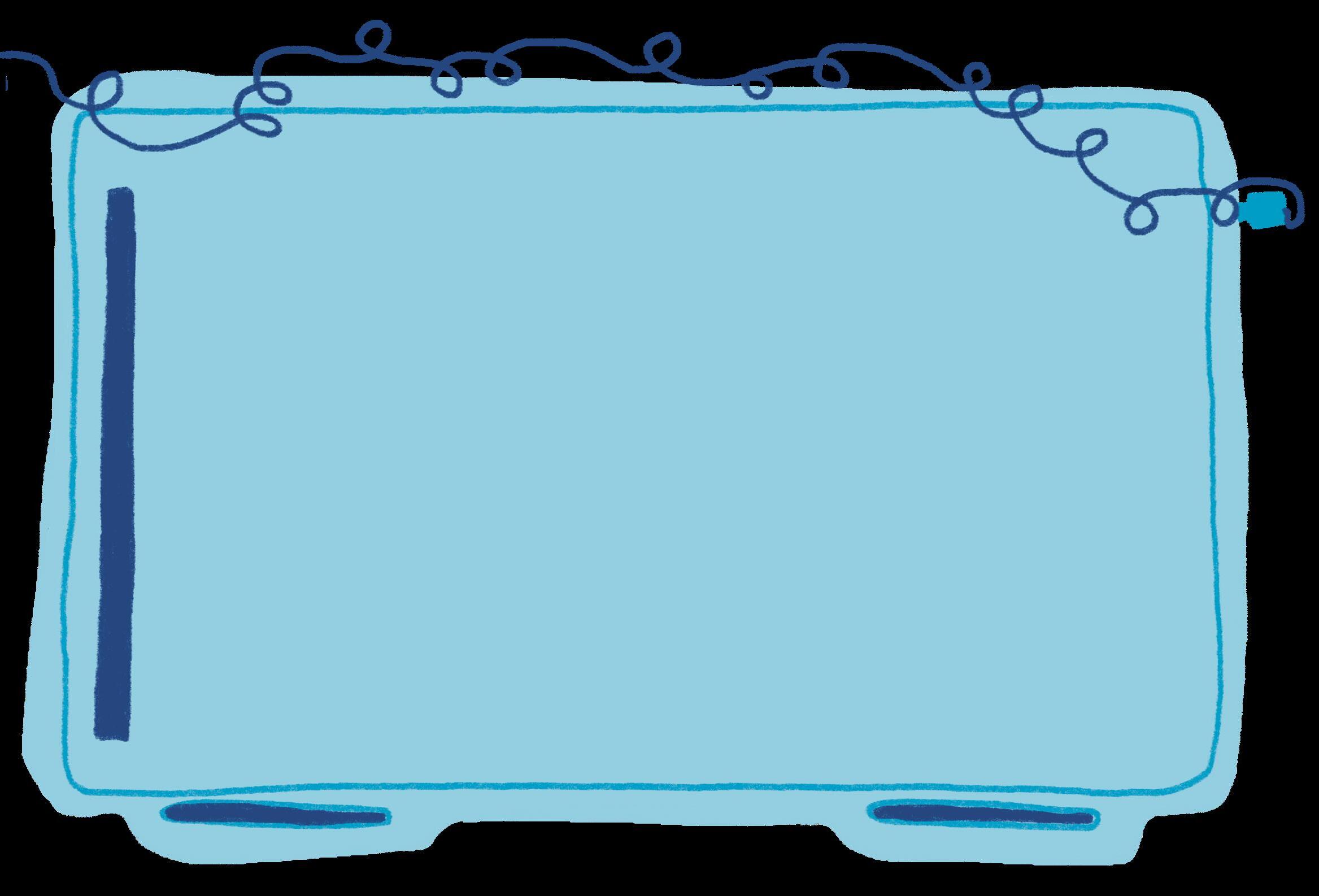
podcasts.
with Speaker of the House Teddy O'Neill (he/it/ia)
"I need to find a trans person! I need to hunt one down!"
Salient Unedited This week, Teddy and Phoebe are joined by two pals who contributed to the Trans Rights issue, and they yap about gender, decolonisation and what to put in a summoning circle to get Teddy to appear, (spoiler alert: it's Cody Rhodes, current Undisputed WWE Universal Champion.)

"It's the zombie apocalypse, what do you do?" - Teddy "First thing, I have an electric bike, so." - Julie-Anne
Arts & Culture This week, join Teddy and Ethan in interviewing Julie-Anne Genter, Green Party MP for Rongotai and the Chatham Islands!

HISTORY IN THE MAKING

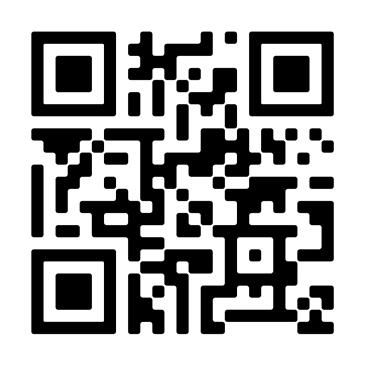
ARTIST podcasts kōnae ipurangi
HOROSCOPES
OUR TIME FOR THE TOP SAT 27 APR | 7:15PM | SKY STADIUM
BE A PART OF IT’S
WELLINGTONPHOENIX.COM
of
GET YOUR TICKETS NOW!
Make the most
student prices!
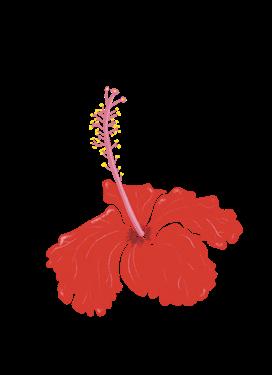
PACIFIC NATIONS & LANGUAGES
Welcome back to Salient’s Pacific language learning! This week we’re looking at Hawai’i, and Wallis and Futuna (‘Uvea mo Futuna), neither of which are included in Aotearoa’s official Pacific Language Weeks.
Hawai'i
Annexed by the US in 1898 after their kingdom was overthrown, Hawai'i is officially classified as a US state. Hawai'i comprises eight main islands: Hawai'i, Maui, O'ahu, Kaua'i, Moloka'i, Lāna'i, Ni'ihau, and Kaho'olawe. Ōlelo Hawai'i and English are the official languages of Hawai'i and her islands. But many locals also speak Hawaiian Pidgin, which emerged when there was an influx of immigrants who came to work on the plantations. However, here, we'll be focusing on 'Ōlelo Hawai'i.
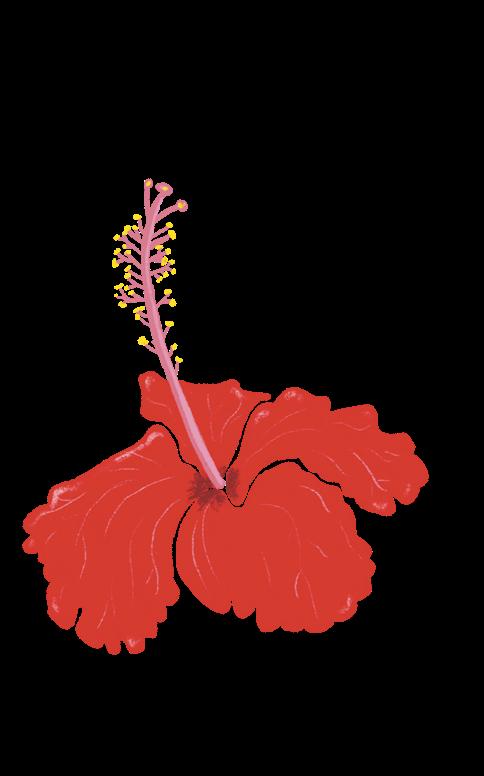
Hawai'i
Email greetings and sign offs
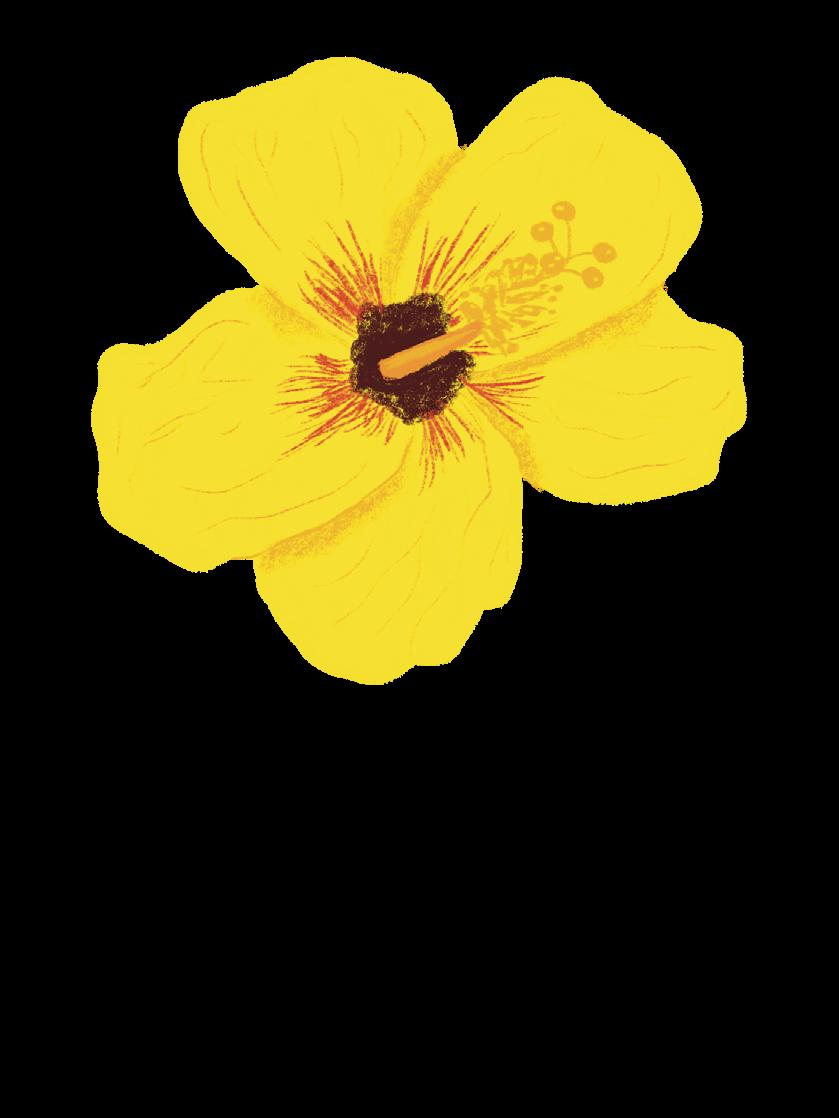
Aloha (kākou) = Hello (everyone)
Mālama pono = Take care
Mahalo (nui loa) = Thank you (very much)

Wallis and Futuna
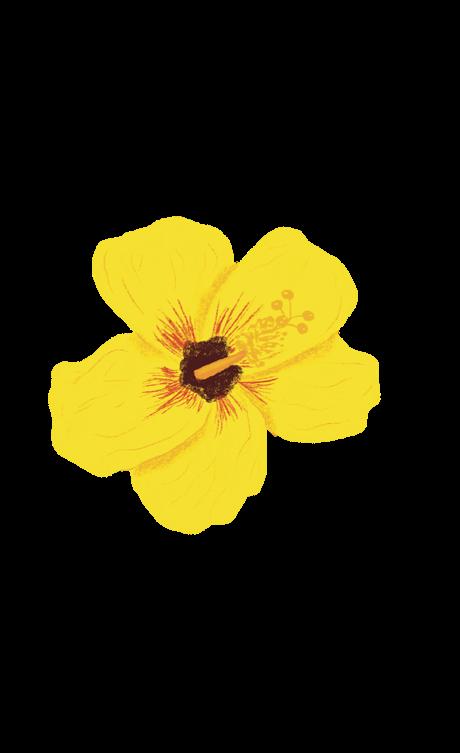
‘Uvea mo Futuna
General phrases
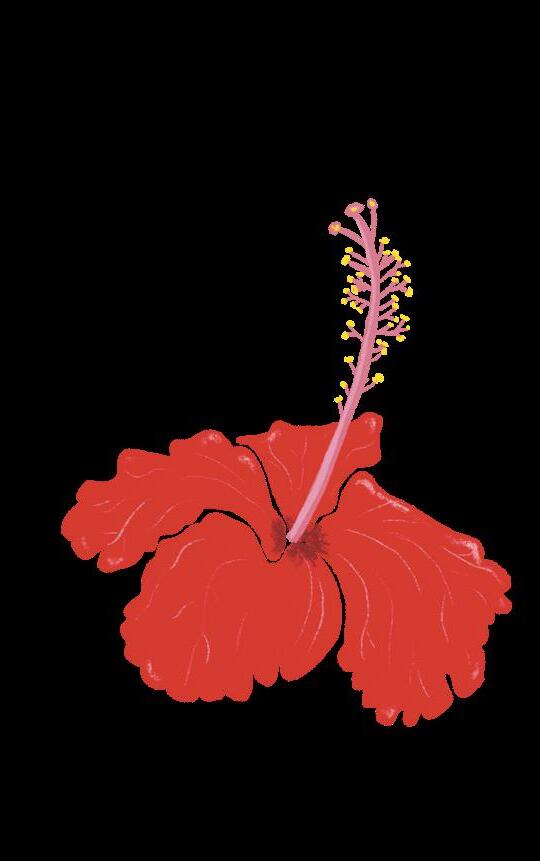
‘O wai kou inoa? = What’s your name?
‘O … ko’u inoa = My name is …
Kānaka Maoli = indigenous people of Hawai’i
Proverb
Ua mau ke ea o ka ‘āina i ka pono = The life of the land is perpetuated in righteousness
Fakafutuna
Email greetings and sign offs
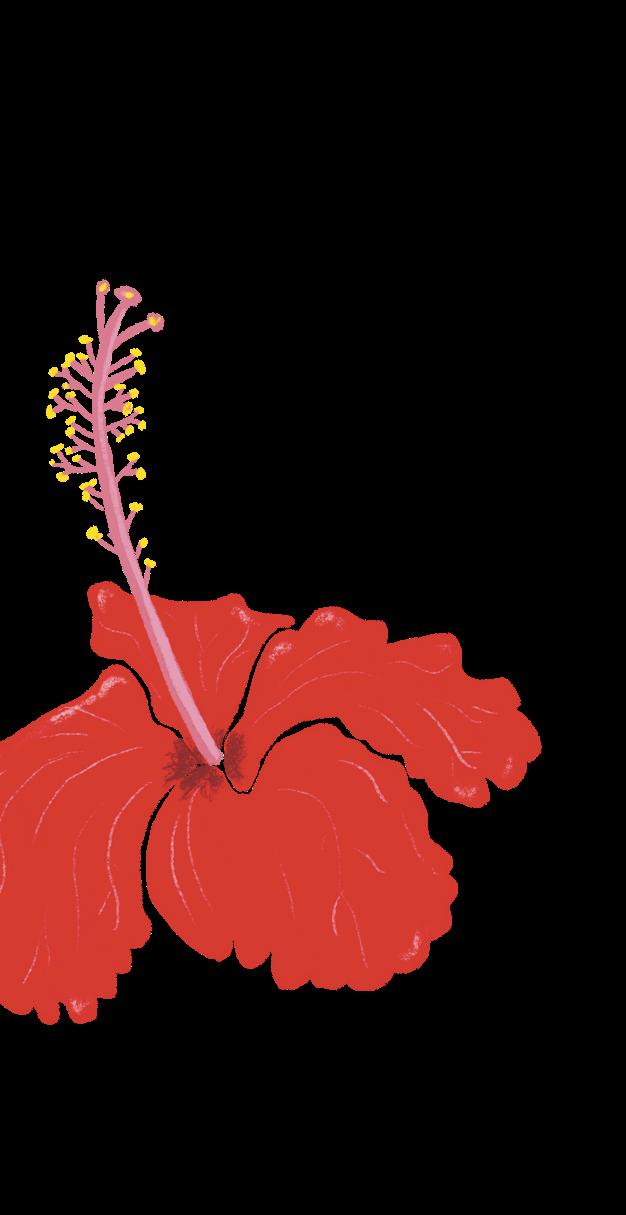

Mālō (le ma’uli / le kataki) = Hello (morning / afternoon) = Thank you = What’s your name?
= My name is …
Email greetings and sign offs
Mālō (te ma’uli / si’i kataki) = Hello (morning / afternoon)
= Thank you
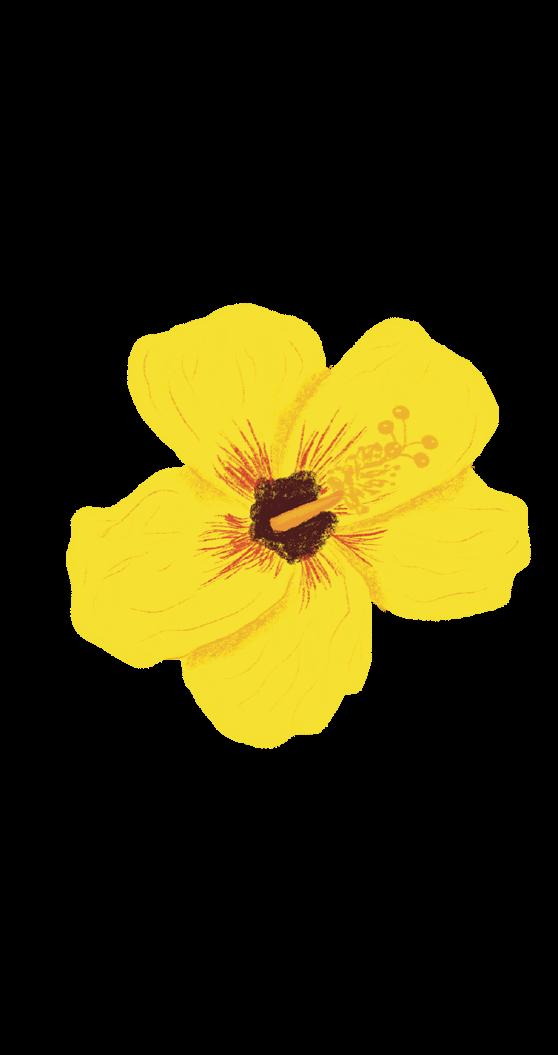
= What’s your name?
= My name is …
Ka tā te fala pea tu’u o me’e = When you hear the beat,


Ngāi Tauira:
Is a rōpū run by Māori for Māori who act as a voice for tauira Māori and provide a range of different activities and supportive services. If you need any tautoko, want to know more, get involved or wanna just hang visit them on level two of Student Union building, follow there social media accounts or email: tumuaki@nt.org.nz
Introducing the 2024 Ngāi Tauira Komiti Whakahaere!!
Tumuaki Takirua
Te Waikamihi Lambert (She/her) (Ngāti Awa, Ngāi Tūhoe, Ngāti Ruapani, Ngāpuhi)
Sterling Maxwell (She/her) (Ngāti Porou, NgāpuhiNgāti Hine)
Pou Tikanga/Tumuaki Tuarua: Currently Vaccant - for more info or to express interest see NT or email tumuaki@nt.org.nz
Kaituhi:
Ataraira Cameron (She/her) (Ngāi Ranginui, Ngāti Rangiwewehi, Waitaha-ā-Hei, Ngāti Hinerangi)
Kaitiaki Pūtea:
Tuiatekawe Tapuke (She/her) (Te Ati Awa Taranaki, Ngāti Raukawa, Ngāti Toa Rangatira)
In our recent IGM, we laid out the key areas that will guide our work and engagement with tauira throughout the year. Our focus is threefold: the inauguration of the Living Pā, a hub for community and cultural exchange; a commitment to political advocacy touching on pivotal issues such as Te Tiriti o Waitangi, environmental stewardship, and international student solidarity, notably with Students for Justice in Palestine; and fostering whakawhanaungatanga, the process of establishing relationships and a sense of family connection.
Our partnership with VUWSA-Te Aka Tauira remains a cornerstone of our efforts, as we presented an annual plan that aligns with the ambitious five-year strategic vision we share. This blueprint is not just a roadmap but a commitment to our shared future and the values we hold dear.
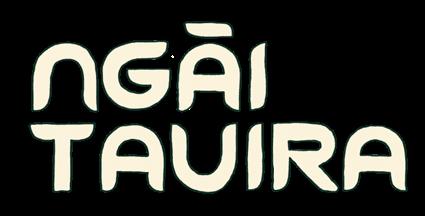

Āpiha Mātuaranga:
Mairangi Campbell (He/him) (Tūhoe, Ngāti Porou)
Āpiha Whakangahau:
Hemaima Keane (She/her) (Ngāi Tāmanuhiri, Rongowhakaata)
Āpiha Tūmatanui: Te Rātā Campbell <3 (She/her) (Te Rarawa, Te Aupōuri)
Āpiha Hauora: Amira Hynes (She/her) (Rangitāne)
As we look ahead, we're excited about upcoming events that embody our mission. Pūrangiaho, scheduled for the 3rd and 4th of May, promises to be a transformative experience for our first-year students and tuākana, offering a deeper dive into the lifeblood of our university and marae. It's an opportunity to bridge the gap between the academic and the cultural, the new and the established.
In addition, our Āpiha Mātauranga is at the forefront of pioneering a Māori Students Academic Rep board. This initiative is a testament to our dedication to academic excellence and representation, ensuring that Māori voices are heard and respected within the academic sphere.
During our elections, we were thrilled to welcome Amiria Hynes as the new Āpiha Hauora. Amiria's role is critical to the wellbeing of our students, and we are confident in her ability to make a significant impact. Meanwhile, we are actively seeking a passionate individual to fill the role of Pou Tikanga, someone who will uphold and guide us through our cultural practices and protocols.
page 33 the news kawepūrongo
words by Te Huihui o Matariki Chi Huy Tran (he/him) (Taranaki Tūturu, Te iwi o Maruwharanui, Ngāti Maniapoto)
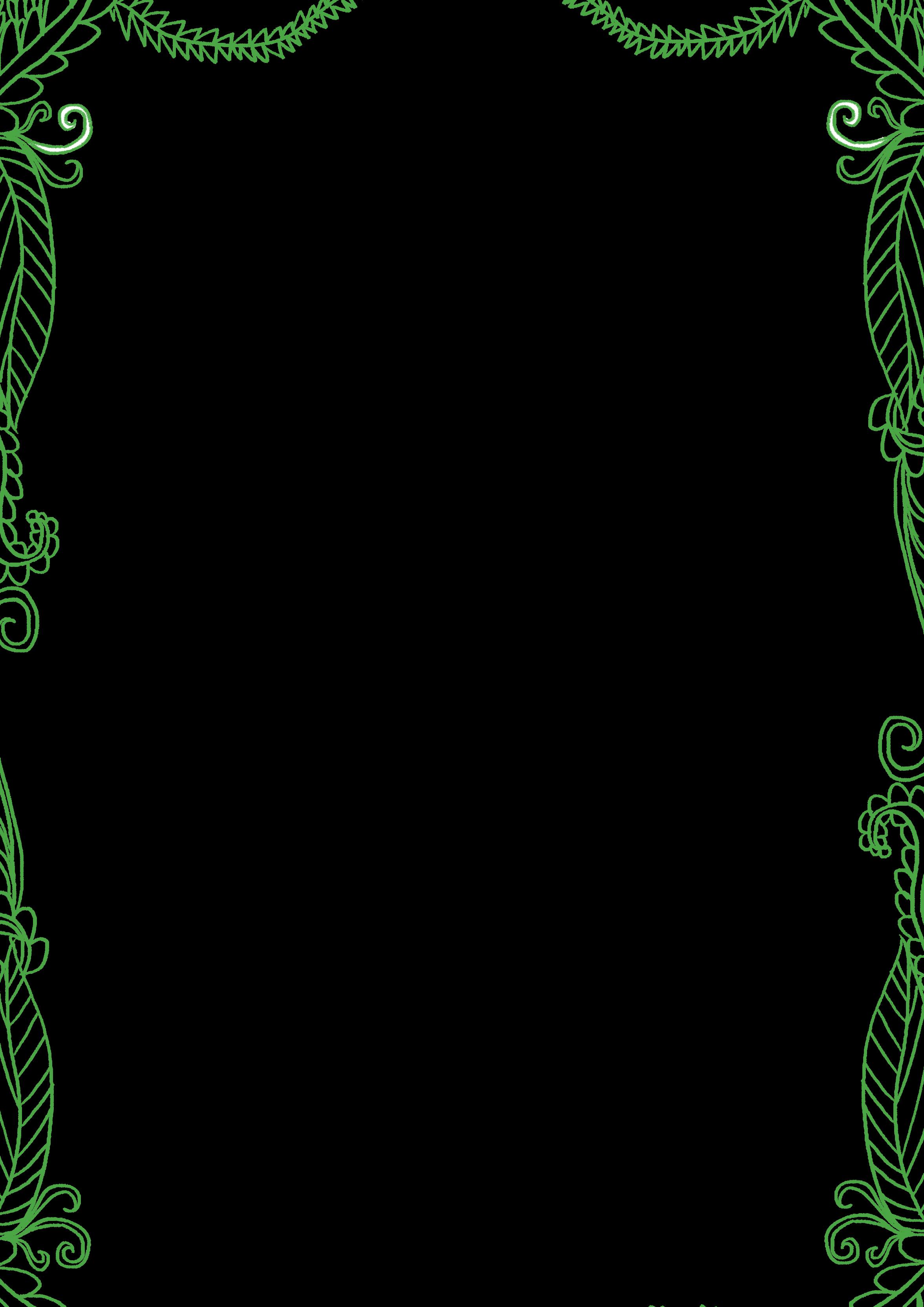
Ministry of Pacific Peoples jobs cuts
words by Ashleigh PuttFallows (she/her/ia) (Ngāti Whātua, NgāpuhiNgāti Hine, Tūhoe)
Government mandated spending cuts will see the Ministry of Pacific Peoples shrink by 40%, removing 63 of 153 positions, in a move the union called “brutal”. The ministry will pause its recruitment, and offer voluntary redundancies. PSA national secretary Duane Leo: “This is a community that needs dedicated government support … Pasifika families are more likely to live in overcrowded, unhealthy housing … their families are more likely to struggle financially than other New Zealanders. The Pasifika population has also grown rapidly—by 43% between 2006 and 2018, twice the rate of New Zealand’s population.”
The ministry is responsible for ~400,000 people in Aotearoa. Leo also stated: “these cuts show the low level of importance this Government accords the Pasifika community”, adding, in reference to David Seymours election rhetoric, “[u]nfortunately, this isn’t surprising given a senior Cabinet member joked before the election about blowing the ministry up.”
words by Te Huihui o Matariki Chi Huy Tran (he him) (Taranaki Tūturu, Te iwi o Maruwharanui, Ngāti Maniapoto)
words by Ashleigh PuttFallows (she/her/ia) (Ngāti Whātua, NgāpuhiNgāti Hine, Tūhoe)
Te Hunga Roia Māori o Aotearoa:
Shane Jones’ Tribunal Critique “inappropriate, unconstitutional”
words by Ashleigh PuttFallows (she/her/ia) (Ngāti Whātua, NgāpuhiNgāti Hine, Tūhoe)
Last week, in an interview with Waatea News, Minister Shane Jones criticised the Waitangi Tribunal’s “grilling” of ministers, and said he was looking forward to reviewing its powers as part of the coalition agreement. Te Hunga Roia Māori o Aotearoa has sent a complaint to Luxon, labelling his comments "inappropriate, [and] unconstitutional”. The rōpū hopes to establish whether Jones' comments breach the Cabinet Manual, and for Judith Collins to "uphold the integrity of the judicial branch of government within the cabinet". Jones' comments came after the Minister of Children, Karen Chhour, was summoned to the Tribunal to explain her reasoning for removing the Tribunal-related section of the Oranga Tamariki Act. She refused to attend, and the Crown filed for Judicial Review with the High Court. The rōpū argues Jones’ comments effectively undermine both the tribunal act, and its processes. The rōpū stated "it’s not the role of the executive" such as ministers to make comments like this, as it "undermines the integrity of our system of Law".
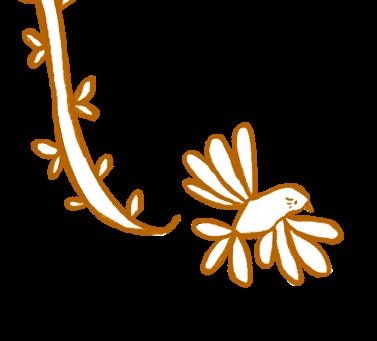
IT’S THE FUCKING NEWS
kawepūrongo
22.04.2024
OPINION: Nic Smith—Freedom of Speech Crusader
HENRY BROADBENT (HE/Him)
Earlier this month an email from the Office of the Vice Chancellor Nic Smith circulated among staff, excitedly promoting “a panel discussion about the rights and responsibilities associated with freedom of speech”. The panellists will: “explore ideas around contributing to controversial debate, [and] the importance of separating the topic under discussion from identity politics”.
The issue of free speech is one of increasing importance to our VC. In February he published an opinion column in The Post, about just that. The column reveals that his growing focus is spurred on, in no small part, by ACT’s insistence on a clause in the coalition agreement requiring universities to “commit to a free speech policy” in order to receive public funding. David Seymour has for some time been banging on about funding cuts to universities which fail to “protect free speech”.
Smith’s reaction to this, in The Post, revolved around what he perceives as an increasingly polarised social fabric in Aotearoa. “So much of our literature and science”, he writes, “has been shaped by productively bringing conflicting views together”. This is a dynamic he fears is under threat in a macro sense, but particularly at universities. Instead, he sees an environment in which “those occupying the middle ground are stepping back from publicly contributing to discussions” for fear of reputational reprisal.
As an aside before we return to the panel, let’s briefly focus on this lament for a distant past of ‘robust academic debate’, a refrain that often appears around academic freedom of speech. A 2016 history of university reforms from the Productivity commission reveals that, prior to education reforms from 1980-99, “[s]tudents from lower socio-economic groups were substantially under-represented in post compulsory education and training. The system was insufficiently sensitive to the needs of ethnic groups (particularly Māori and Pasifika) and of women.”
That fact alone goes a long way in explaining why Smith and his cohort might have had a more harmonious time at university, back in the day. It was a more homogenous space. The range of student
experience, and thus the poles of debate, were closer together. Sure, social media has had a ruinous effect on, well, everything, but casting twitter as the sole reason people don’t let old white guys say whatever they want anymore might be lacking in nuance.
Anyways, back to the panel. So far, so vaguely concerning. On April 10th an announcement (visible only to staff) was put out ‘confirming’ the five panellists, ostensibly representing a cross-section of opinion in Aotearoa. The panel has five members. There are no Māori voices, three are men, and the median age is at least 40. There has since been talk of additions.
Of particular concern to student groups (and Salient) is the presence of Johnathan Ayling on the panel, CEO of the Free Speech Union. I’ll lead you on a whistle-stop tour of him and the FSU’s most egregious activities in recent memory. This will be far from exhaustive, as space in the magazine is limited.
Ayling himself explicitly supported Julian Batchelor during his anti-co governance roadshow. For those lucky people out of the loop, Batchelor spent a vitriolic few months touring the country spewing conspiracy theories about “elite Māori” taking over Aotearoa, comparing ‘Kia Ora’ to ‘Seig Heil’, and describing policies supporting Māori as ‘apartheid.’ Māori people were excluded from his meetings. This generated legitimate and necessary counterprotest. In response, Ayling described Batchelor as “discriminated against”.
The FSU has also thrown its weight behind actively transphobic, hateful, and violent rhetoric from Graham Linehan and Posie Parker. And for those who are cautious about deplatforming people, Batchelor, Linehan and Parker’s speech fits clearly under UN definitions of hate speech: “[speech] that attacks or uses pejorative or discriminatory language with reference to a person or a group on the basis of who they are”.
The question is why Nic Smith and the University feel Johnathan Ayling’s vocal and consistent support of hate speech is legitimate. Nic Smith is offshore, and unavailable for comment.
page 35
CONTINUED ON PAGE 36

CONTINUED FROM PAGE 35
Salient visited the Provost/Acting Vice Chancellor, Bryony James, for a kōrero. The conversation was productive and wide-ranging, and revealed a genuine desire from James and Reece Moores (Director of the Office of the VC) to counter what they see as corrosive and polarising online discourse. They too are worried that productive dialogue has been harmed by social media, and are seeking a remedy.
It’s important to note that their solution is an interesting fix, and one we should be open to. Moores and James stressed the mediated debate format would allow fact-checking. They acknowledged the total absence of Māori voices was an issue, and assured Salient they were working to amend it—so watch this space. The idea is a good one, but this specific panel aint it.

Advocates Push Government To Rethink Aotearoa’s Web Filters
“While you read this, kids around New Zealand are accidentally stumbling across violent sexual content online.”
That’s what the header on the organisation Makes Sense’s website reads, and that’s what its founders are calling on the Government to put a stop to. Set up by sex therapist Jo Robertson and parenting presenter Holly Brooker, Makes Sense aims to prevent children accidentally accessing illegal, harmful content on the internet.
The current filter set up by DIA—and used by a number of internet service providers (ISPs)—only blocks 9.5% of known child sex abuse material online. Jo Robertson told Salient, “It's a very dated process, relying on a manual inputting of URLs containing this material.”
“The technology is there—other countries are using machine learning models to capture this content … but we’re still relying on a manual process of analysts mentions of sexual violence.
actually typing in the URLs.” She argues that this causes harm for the manual filters that have to view the content, and that it is an inefficient process for the modern online landscape.
On 11 April, Robertson and Brooker presented a petition to MPs from across parties, calling for Parliament to mandate that ISPs filter for an array of harmful online content, including child sex abuse material. Currently, it is only voluntary for ISPs to filter for such content.
“These videos aren’t deep down in the dark web—these videos are on the open web, where our children can easily see them, accidentally, while they are simply doing their homework,” said Brooker at the petition handover. “Other countries have taken on initiatives to block this illegal content, but we are simply not meeting global standards.”
The petition gathered over 10,500 signatures, and is currently awaiting presentation to the House.
page 36
the news kawepūrongo
ETHAN ROGACiON (HE/Him)
CONTENT WARNING
PICTURED: People gather to protest for greater child protection alongside a hand painted banner stating 'CHILD PROTECTION MAKES SENSE.org.nz

Attrition on the Front Line: Does Ukraine Have a Path Forward?
DAN mOSKOViTZ (HE/Him)
26 months on, and the Russo-Ukrainian war looks no closer to ending.
An initial successful Ukrainian counter-offensive in 2022 raised hope for a Ukrainian victory, but their 2023 follow-up offensive failed to make the front lines budge. Russia, meanwhile, has been making incremental progress across the front line, though Ukraine appears to be extracting a high price in blood for each step. It’s all very reminiscent of the First World War, where defensive trenches turned any attacking movements into bloodbaths for the offensive side.
Still, there are warning signs for Ukraine. $60 billion of American aid has been held up in Congress by hard-line Republicans, while an EU promise to deliver a million shells failed to reach its goal. The result? Ukraine is short of ammunition, and weaker than it should be.
The current front line extends across Ukraine’s four eastern oblasts of Kherson, Zaporizhzhia, Donetsk, and Luhansk. All four were controversially annexed by Russia (without even fully controlling them) via dubious referendums in 2022. As such, the Russian claim is not widely recognised.
These oblasts are the greatest sticking point to any peace deal, according to Jim Headley, an associate professor of politics at Otago who studies Russian foreign policy. Russia says they’re Russian, Ukraine (and everyone else) says they’re Ukrainian.
While very clear that these are not predictions, Headley laid out some potential scenarios for how this war could end. The first would involve Ukraine surrendering the oblasts for peace.
“It’d be very difficult for Ukraine to drive Russia out of these territories, but equally difficult to accept losing these territories to Russia,” says Headley.
“But in any agreement, Russia would need to accept the rest of Ukraine as independent. But how can Ukraine trust that? You’d probably need a commitment from the west to defend Ukraine if Russia were to attack again.
“I think it would take a long time to get there. It would require a lot of change in western politics
around supporting Ukraine, and also changes in Ukrainian policy to accept that they’re not going to get them back.”
An equally realistic scenario according to Headley is the four oblasts mimicking the situation in Crimea before the war. Crimea, a Ukrainian peninsula, was illegally annexed by Russia in 2014. While not internationally recognised as Russian land, it has been controlled by Moscow since annexation.
This scenario sees things reach either stalemate or cease-fire, but not true peace.
But again, we’re a long way from this outcome too. Not only would it be difficult for the west and Ukraine to stomach, but Russia would also be far from happy.
“Putin has ramped up the rhetoric about trying to take the whole of Ukraine, so it would take time for his propaganda machine to sell the idea that they’d been successful with just stalemate in the oblasts,” says Headley.
There is always the mythical revolt against Putin, but it’s unlikely. There’s very little sign of revolution, and even if one did spontaneously occur, any replacement would come from within the system.
“An alternative leader isn’t going to be someone who comes in and says the war was a big mistake, Putin was evil, and the West is our friend. There's just no constituency for that.”
Rather, the bigger question for Ukraine is November’s presidential rematch between Joe Biden and Donald Trump.
“Ukraine is reliant on Western support. That’s expensive and depends on local politics.
“If Trump gets in, who knows what's going to happen?”
After all, Ukraine’s struggles are already in part due to hard-line congressional Republicans preventing $60 billion in aid from reaching Ukraine.
page 37
the news kawepūrongo

“It’s nonsense”: Government Bringing Back Māori Ward Referendums
ETHAN ROGACiON (HE/Him)
Despite everyone telling them that it is anti-democratic and a bad idea (so nothing new, really) the Government are forging ahead with plans to reinstate referenda for Māori wards on local councils.
Since 2021, councils that have wished to create a Māori ward have been able to do so by a simple resolution, rather than the binding referendums that the Local Electoral Act 2001 had previously required. The explanatory note for that bill cited that the previous requirement, for at least 5% of all of a city’s eligible electors to vote in favour, was “an almost insurmountable barrier to improving Māori representation in local government.”
However, not all saw this development as positive—including Dancing With The Stars loser and alleged democracy fan David Seymour. “The decision of whether councils should establish Māori wards ought to lie with the communities themselves, not Wellington,” he asserted in a press release.
This is despite councils being democratically elected by and accountable to their communities.
Earlier this month, Local Government Minister Simeon Brown announced that, “The Coalition Government will reverse the previous government’s divisive changes that denied local communities the ability to determine whether to establish Māori wards.”
“The Coalition Government’s view is that any decision to establish or disestablish a Māori ward is one that should remain with communities. This does not affect councils’ responsibilities to consult with mana whenua on issues that affect them.”
Importantly, this would mean that councils that have already established Māori wards—including Wellington City Council—would be required to hold a referendum on whether to keep their wards at the next local elections in 2025.
Nīkau Wi Neera, councillor for Te Whanganui-a-Tara Māori ward, told Salient,
“The concept that it's restoring some lost democratic input is preposterous. No other representation change whatsoever requires a referendum, except to grant Māori the representation guaranteed to them under Te Tiriti o Waitangi.”
“We could restructure the entire Council to be 16 seats for Grenada North and we still wouldn't need a referendum—yet Māori participation is still viewed as a usurping of democracy on our own land. It's nonsense.”
Criticism has also come from academics, who have questioned the policy’s democratic implications. Law lecturer Professor Dean Knight said that “[b]inding referendums on the establishment of Māori wards reflects out-of-date and unjust thinking, where the rights and interests of a minority are only realised if the majority allows.”
“It’s also important to remember that the principle of one person, one vote remains; Māori wards merely recognise communities of interest for iwi, in a similar way to how general wards geographically group ratepayers in different communities of interest, such as clustering rural voters together.”
Professor Knight also noted that, at the same time as the Government are mandating that councils hold referendums on Māori wards, it is also rolling back proposals that would have allowed 16 and 17-year olds to vote in local elections “on the basis that doing so would be a costly distraction for local government.”
“[R]einstating local referendums for Māori wards will be even more costly and distracting—and unnecessary when those Māori wards have been democratically established by local communities’ elected representatives.”
page 38
the news kawepūrongo
SALIENT TEAM 2024
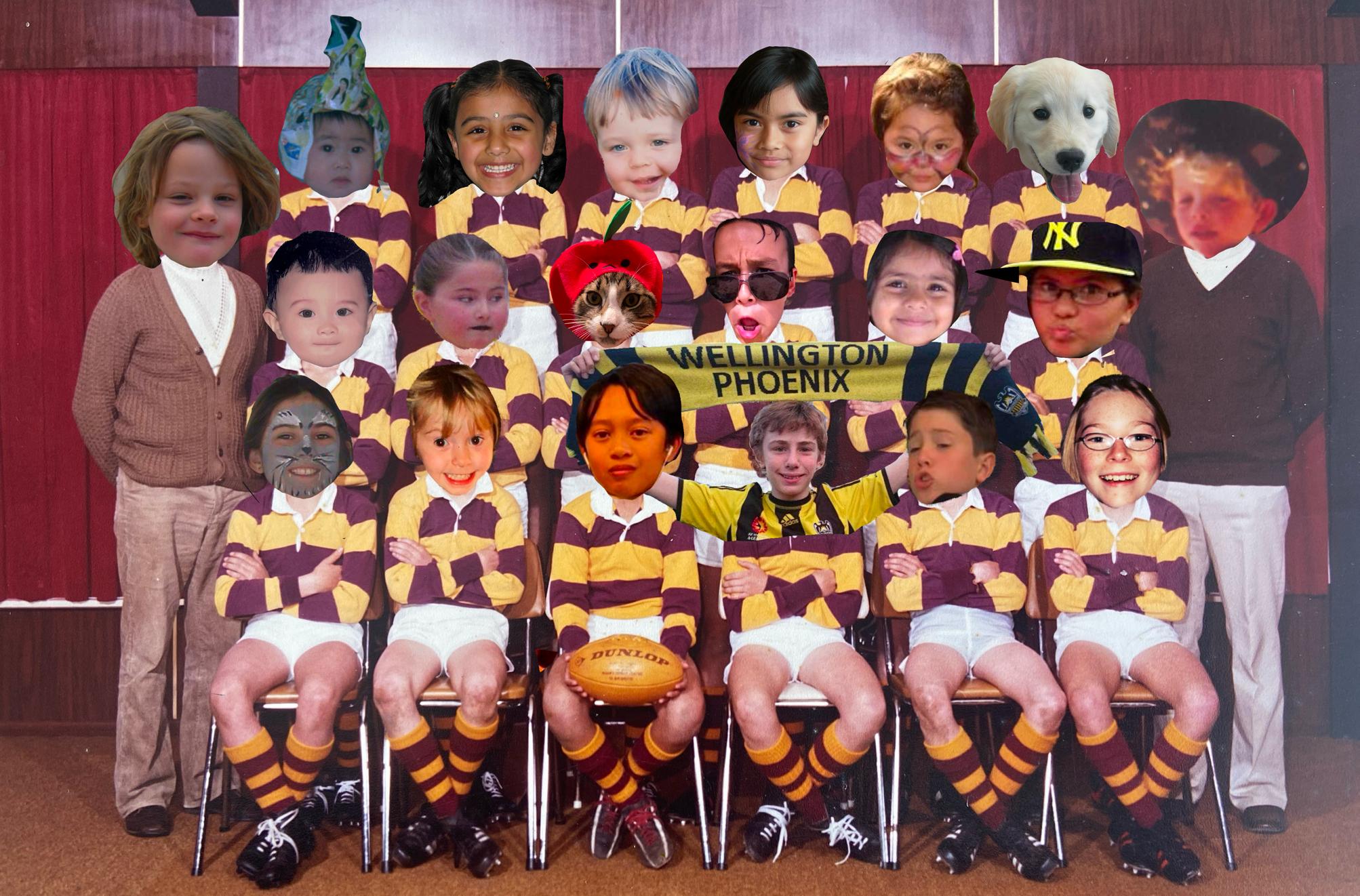
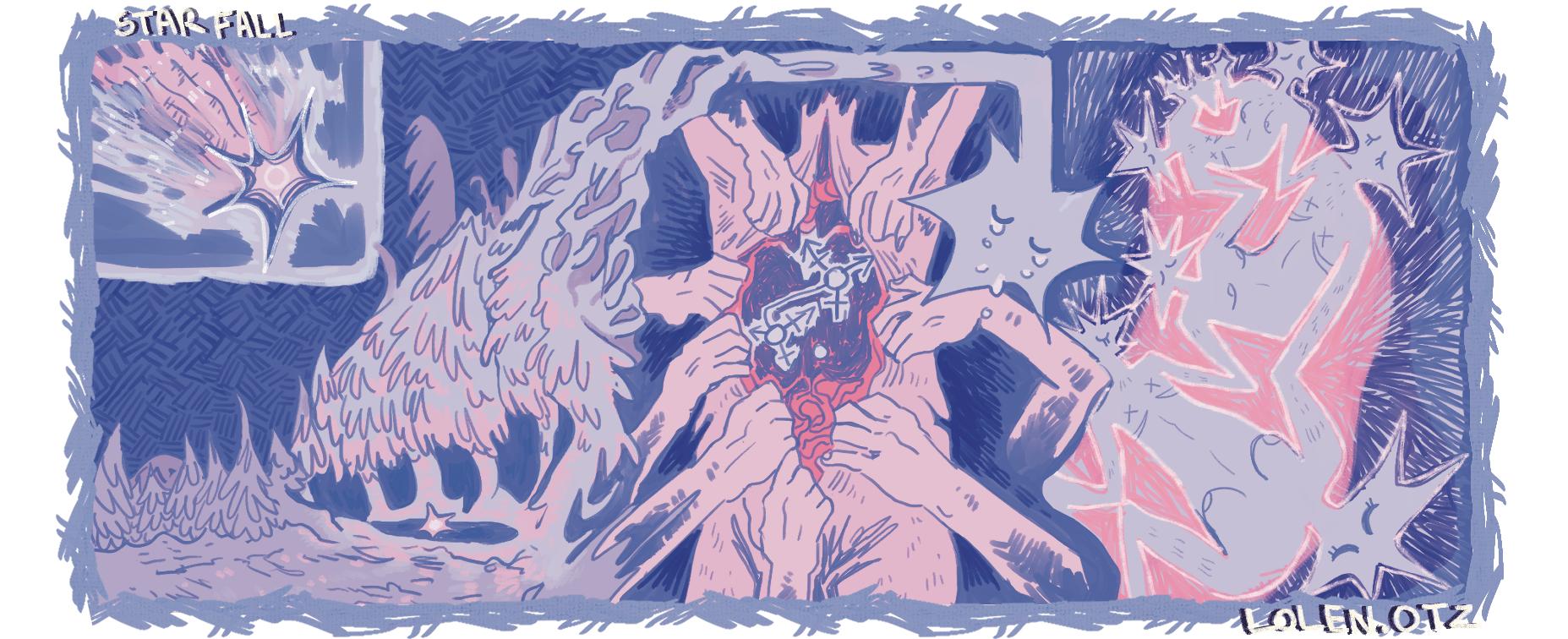
page 39
Submit a comic:
This week's comic artist: @lolen.otz
designer@salient.org.nz
Third Row: Ngan Dang (she/they, Staff Writer Intern) ; Monisha Dahya (she/her, Podcast Intern) ; Darcy Lawrey (he/him, Online & News Intern) ; Prunella Prunella Azzahra (she/her, Design Intern) ; Ceder Porteous (she/her, Staff Writer Intern) ; Phoebe's Dog
Second Row: Phoebe Robertson (she/her, Editor) ; Te Huihui Tran (he/him, Te Ao Māori Co-Editor) ; Ashleigh PuttFallows (she/ her, Te Ao Māori Co-Editor) ; M&M (Ash's cat) ; Guy van Egmond (he/him, Contributing Writer) ; Jia Sharma (she/her, Music Editor); Mauatua Fa'araReynolds (she/her, Staff Writer) ; Henry Broadbent (he/him, Sub-Editor)
Front Row: Teddy O'Neill (he/it/ia, Speaker of the House) ; Ava O'Brien (she/her, Distributor) ; Ethan Rogacion (he/him, News Co-Editor) ; Dan Moskovitz (he/him, Chief Reporter) ; Will Irvine (he/him, News Co-Editor) ; Kate Seager (she/her, Designer)
